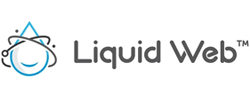30 Best Web Hosting Services Company
Last updated on January 19, 2025 by RGB Web Tech

Introduction of Cheap Web Hosting Service
Cheap web hosting service refers to a type of web hosting that is available at a low cost. This hosting service is suitable for individuals, small businesses, or anyone who needs a simple website without the need for advanced features or high-performance servers.
A cheap web hosting service usually offers a shared hosting plan, where multiple websites are hosted on a single server. This type of hosting service is typically less expensive than other hosting options like dedicated hosting or VPS hosting, as the cost of server maintenance and upkeep is shared among multiple users.
While cheap web hosting services may have some limitations, such as limited storage space or bandwidth, they can still provide users with the basic tools and features needed to create and manage a website. These features may include a website builder, email accounts, and access to cPanel or other management tools.
Overall, a cheap web hosting service can be a good option for those on a tight budget who need to get a website up and running quickly without the need for advanced features or customization. It is important to research different providers to find one that offers reliable service and good customer support, as well as a plan that meets your specific needs and requirements.
Table of Article Contents
- What is Web Hosting?
- Top 30 Cheap Web Hosting Service Providers
- Advantages of Cheap Web Hosting Service
- Disadvantages of Cheap Web Hosting Service
- Types of Cheap Web Hosting Service
- Paid V/S FREE Cheap Web Hosting Service
- How to choose Cheap Web Hosting Service?
- Features of Cheap Web Hosting Service
- FAQs
- Conclusion
- Video
What is Web Hosting?
Web hosting refers to the service of providing storage space and access to web servers to host a website on the internet. In simpler terms, web hosting allows individuals or organizations to make their website accessible via the World Wide Web.
When someone wants to access a website, they enter the website's domain name (such as www.example.com) into their web browser. The browser then sends a request to the web hosting server where the website is stored, and the server responds by sending the website's content back to the user's browser, which displays it on the screen.
Web hosting services can be offered by companies that specialize in web hosting, known as web hosts or hosting providers. These companies provide different types of web hosting plans, such as shared hosting, VPS hosting, dedicated hosting, and cloud hosting, each with different levels of performance, security, and scalability.
Web hosting also involves the use of various software and technologies to manage the hosting environment and provide website owners with tools and features to manage their websites, such as cPanel, FTP access, database management, and email hosting.
Overall, web hosting is an essential service that allows businesses and individuals to establish an online presence and make their website accessible to anyone with an internet connection.
Top 30 Cheap Web Hosting Service Providers
Here are the top 30 cheap web hosting service providers along with their sales, discount and pricing plans:
- Exclusive Sale - Upto 60% OFF
- Starting at
$9.99.00$3.49/month*
Inmotion Hosting
- Alexa Rank 5,622
- Exclusive Sale - Upto 75% OFF
- Starting at
$7.99$1.99/month*
iPage
Advantages of Cheap Web Hosting Service
Here are some advantages of using a cheap web hosting service:
1. Affordability: The most obvious advantage of using a cheap web hosting service is affordability. With low-cost plans, you can get started with your website without breaking the bank.
2. Easy to Use: Most cheap web hosting services provide easy-to-use control panels and website builders, making it easy for even beginners to set up their websites.
3. Scalability: Cheap web hosting plans often allow you to upgrade to higher plans as your website grows. This allows you to start with a basic plan and upgrade as needed, without having to switch to a new provider.
4. Technical Support: Despite being low-cost, most cheap web hosting services offer technical support around the clock to help you with any issues you may encounter.
5. Flexibility: Many cheap web hosting services offer a range of plans with different features, allowing you to choose the one that best fits your needs and budget.
6. Good for Small Websites: If you have a small website with low traffic, a cheap web hosting service may be all you need. You can save money on hosting fees and invest in other areas of your website or business.
7. Backup and Security: Even cheap web hosting services offer backup and security features, protecting your website from data loss and security breaches.
Overall, cheap web hosting services can be a great option for individuals and small businesses looking to launch their website on a budget. However, it's important to research and compare different providers to find the one that best meets your needs and budget.
Disadvantages of Cheap Web Hosting Service
While there are many advantages of using a cheap web hosting service, there are also some potential disadvantages to consider:
1. Limited Resources: Cheap web hosting services often have limited resources, such as storage, bandwidth, and processing power. This can affect the performance of your website and limit its scalability.
2. Reliability: With a low-cost hosting plan, you may experience more downtime or slower website loading times due to the sharing of resources among multiple users.
3. Customer Support: While many cheap web hosting services offer 24/7 customer support, the quality of support may be limited due to the lower price point. You may not receive as much help or expertise as you would with a more expensive hosting provider.
4. Limited Features: Cheap hosting plans may have fewer features and limitations, such as limited email accounts, no automatic backups, or no advanced security features.
5. Shared Hosting: Most cheap web hosting plans are shared hosting, which means your website shares the server with other websites. This can cause performance issues or security risks if one of the other websites on the server experiences a problem.
6. Renewal Costs: Some cheap web hosting providers offer promotional rates for the first year, but the renewal costs may be higher. This can catch some people off guard and cause unexpected expenses.
Overall, cheap web hosting services can be a good option for those on a tight budget, but it's important to consider these potential disadvantages and do your research before making a decision. Look for a hosting provider that balances affordability with reliability, features, and customer support.
Types of Cheap Web Hosting Service
There are several types of cheap web hosting services available, each with its own advantages and limitations. Here are some of the most common types:
1. Shared Hosting:Shared hosting is the most common type of hosting, where multiple websites share the same server and its resources, including storage space, bandwidth, and CPU. It is an affordable option for small businesses and individuals who are just starting with their website.
2. WordPress Hosting:WordPress hosting is a specialized type of web hosting designed specifically for websites built on the WordPress content management system (CMS). WordPress is the most popular CMS in the world, used by millions of websites to create and manage their content.
3. Virtual Private Server (VPS) Hosting:VPS hosting involves a server that is partitioned into multiple virtual servers, each with its own resources, operating system, and control panel. It is a step up from shared hosting, providing more control, flexibility, and security.
4. Dedicated Hosting: With dedicated hosting, a website gets its own server, which means all the resources are exclusively dedicated to that website. This option provides the highest level of control, flexibility, and security, but it can also be expensive.
5. Cloud Hosting:Cloud hosting involves a network of interconnected servers that work together to provide hosting resources. This type of hosting is highly scalable, flexible, and reliable.
6. Managed Hosting:Managed hosting involves a hosting provider managing and maintaining a website's server, including updates, security, backups, and more. This option is ideal for those who do not have the technical expertise to manage their own server.
7. Reseller Hosting:Reseller hosting allows individuals or businesses to purchase hosting resources from a hosting provider and resell them to their clients, usually at a higher price. It is a way to start a web hosting business without the need for expensive infrastructure.
8. Colocation Hosting:Colocation hosting, also known as colo hosting or colocation, is a type of web hosting where a company or individual rents space in a data center to store their own servers and equipment. Unlike traditional web hosting, where a hosting provider owns and manages the servers, in colocation hosting, the client owns and manages their own servers and equipment.
9. Self Service Hosting:Self-service hosting, also known as unmanaged hosting, is a type of web hosting where the client is responsible for all aspects of managing their website, including server configuration, software installation, security, and maintenance. The hosting provider only provides the physical server hardware and internet connectivity, but no management services or technical support.
10. Cluster Hosting:Cluster hosting, also known as cloud hosting or clustered web hosting, is a type of web hosting that uses a cluster of servers to host websites and applications. In a cluster hosting environment, multiple servers work together to provide greater performance, scalability, and reliability than traditional hosting options.
Paid V/S FREE Cheap Web Hosting Service
When it comes to web hosting, you often get what you pay for. While free hosting may seem like an attractive option for those on a tight budget, there are some key differences between paid and free cheap web hosting services that you should consider.
Paid Web Hosting Service:
Advantages:
- More reliable: Paid web hosting services typically offer more reliable and consistent performance than free hosting services.
- More resources: Paid hosting plans typically offer more resources, such as storage, bandwidth, and processing power, than free hosting plans.
- Better customer support: Paid hosting providers often offer better customer support, with faster response times and more experienced technicians.
- More features: Paid hosting plans typically offer more features and tools, such as automatic backups, advanced security features, and website builders.
Disadvantages:
- Cost: Paid hosting plans come with a cost, which may be a barrier for those on a tight budget.
- Contract length: Many paid hosting providers require a minimum contract length, which may not be suitable for those who are unsure about their website's future needs.
Free Web Hosting Service:
Advantages:
- No cost: The main advantage of free hosting is that it's free, making it a good option for those on a tight budget.
- Easy to use: Free hosting services often offer simple and easy-to-use website builders and control panels.
- No contract: Free hosting services typically don't require a contract, which provides more flexibility.
Disadvantages:
- Less reliable: Free hosting services often have limited resources and may not offer consistent performance or uptime.
- Limited features: Free hosting plans may have limited features and may not offer advanced tools such as automatic backups or advanced security features.
- Limited support: Free hosting providers may not offer as much support as paid providers, and the support may not be as experienced or responsive.
- Advertisements: Some free hosting services display advertisements on your website, which can be distracting or unprofessional.
Overall, if you're serious about your website and want reliable performance, more features, and better support, paid hosting is generally the better choice. However, if you're on a tight budget and don't need advanced features, free hosting can be a good option to get started.
How to choose Cheap Web Hosting Service?
Choosing the right cheap web hosting service can be a daunting task, especially if you're new to web hosting. Here are some key factors to consider when choosing a cheap web hosting service:
1. Reliability and Uptime: Choose a web hosting company that has a reputation for high uptime and reliability. You want a provider that guarantees at least 99.9% uptime, ensuring that your website is always available to visitors.
2. Server Speed and Performance: Choose a web hosting provider with fast servers and high performance. Slow-loading websites can negatively impact user experience and search engine rankings.
3. Scalability and Flexibility: Choose a web hosting provider that can scale and grow with your website. Your hosting plan should allow you to easily upgrade or downgrade your resources as your needs change.
4. Security: Choose a web hosting provider that takes security seriously, with measures such as SSL certificates, firewalls, malware scanning, and regular backups to protect your website and data.
5. Customer Support: Choose a web hosting provider that offers reliable and accessible customer support, with multiple channels such as phone, email, and live chat available 24/7.
6. Pricing and Value: Choose a web hosting provider that offers a good balance between pricing and value, with transparent pricing and no hidden fees. Compare pricing and features across multiple providers to find the best fit for your needs and budget.
7. User-Friendly Control Panel: Choose a web hosting provider that offers a user-friendly control panel, such as cPanel, which allows you to easily manage your website, email, and other hosting features.
By considering these factors, you can choose a best website hosting service that meets your need and provide a reliable platform for your website.
Features of Cheap Web Hosting Service
Cheap web hosting services may vary in terms of the specific features they offer, but here are some common features you can expect from a good cheap web hosting service:
1. Storage Space: Web hosting provides storage space for all website files, including images, videos, and web pages.
2. Bandwidth: Bandwidth refers to the amount of data that can be transferred between the website and its visitors. Web hosting providers offer different bandwidth limits, so choose a plan that meets your website's needs.
3. Domain Name: A domain name is the website address that visitors use to access your site. Many web hosting providers offer domain registration services.
4. Email Accounts: Web hosting often includes email accounts, which allow you to use your domain name for email addresses, such as [email protected].
5. Control Panel: A control panel allows you to manage your website, email accounts, and other hosting features.
6. Security Features: Web hosting providers offer various security features, such as SSL certificates, firewalls, and malware scanning, to protect your website and data from online threats.
7. Website Builder: Some web hosting providers offer website builders, which allow you to create a website without coding or design skills.
8. Backup and Recovery: Web hosting providers should offer regular backups and a recovery system in case of data loss or website issues.
9. Technical Support: Good web hosting providers offer 24/7 technical support, with multiple channels such as phone, email, and live chat.
10. Scalability: As your website grows, you may need more resources, so choose a web hosting provider that allows you to easily upgrade or downgrade your plan to meet your needs.
FAQs - Cheap Web Hosting Service
Here are some frequently asked questions about cheap web hosting service:
1. What is a cheap web hosting service?
Answer : Cheap web hosting service is a hosting service that offers web hosting at a low cost, usually starting at a few dollars per month. These hosting services are suitable for small websites and individuals who have a limited budget.
2. What are the advantages of a cheap web hosting service?
Answer : The advantages of cheap web hosting services are that they are affordable, easy to use, and can provide all the necessary features to host a website. They are also suitable for small businesses and individuals who have a limited budget.
3. What are the disadvantages of cheap web hosting service?
Answer : The disadvantages of cheap web hosting service are that they may not provide the best performance, uptime, or customer support. They may also have limitations on the resources and features provided.
4. What are the types of cheap web hosting services?
Answer : The types of cheap web hosting service include shared hosting, VPS hosting, cloud hosting, and reseller hosting. Each type has its own advantages and limitations.
5. What should I look for when choosing a cheap web hosting service?
Answer : When choosing a cheap web hosting service, you should consider factors such as price, uptime, performance, features, support, scalability, and reputation.
6. Can I upgrade my hosting plan later?
Answer : Yes, most hosting providers allow you to upgrade your hosting plan as your website grows and requires more resources.
7. Is a free web hosting service a good option?
Answer : Free web hosting service may be a good option for personal websites or experimental projects, but it may not provide the best performance, uptime, or security. It may also have limitations on the resources and features provided. Paid hosting services are generally recommended for businesses and serious websites.
8. What is bandwidth?
Answer : Bandwidth is the amount of data that can be transferred between your website and its visitors. Web hosting providers offer different bandwidth limits, so choose a plan that meets your website's needs.
9. What is a domain name?
Answer : A domain name is the website address that visitors use to access your site. Many web hosting providers offer domain registration services.
10. What is a control panel?
Answer : A control panel is a web-based interface that allows you to manage your website, email accounts, and other hosting features.
11. What is SSL?
Answer : SSL (Secure Sockets Layer) is a security protocol that encrypts data between the website and its visitors. It is important for securing online transactions and protecting sensitive data.
12. What is a website builder?
Answer : A website builder is a tool that allows you to create a website without coding or design skills. Some web hosting providers offer website builders as part of their hosting plans.
13. What is uptime?
Answer : Uptime refers to the amount of time that your website is online and accessible to visitors. Good web hosting providers guarantee at least 99.9% uptime.
14. What is shared hosting?
Answer : Shared hosting is a type of hosting where multiple websites share the same server and its resources. It is an affordable option for small businesses and individuals who are just starting with their website.
15. What is VPS hosting?
Answer : VPS hosting involves a server that is partitioned into multiple virtual servers, each with its own resources, operating system, and control panel. It is a step up from shared hosting, providing more control, flexibility, and security.
16. What is dedicated hosting?
Answer : Dedicated hosting involves a website getting its own server, which means all the resources are exclusively dedicated to that website. This option provides the highest level of control, flexibility, and security, but it can also be expensive.
Conclusion - Cheap Web Hosting Service
In conclusion, cheap web hosting services are an excellent option for individuals and small businesses that have a limited budget. While they may have some limitations compared to more expensive hosting options, they can provide all the necessary features to host a website. When choosing a cheap web hosting service, it's important to consider factors such as price, uptime, performance, features, support, scalability, and reputation. By doing your research and comparing multiple hosting providers, you can find a reliable and affordable hosting service that meets your needs.
You now know which the best Web Hosting Services company is, and you are ready to try one out. Good luck in the world of hosting!
If this article is helpful for you, please share it on your social media handles Because sharing is caring!
If you found this article helpful, we encourage you to share it on your social media platforms—because sharing is caring! For more information about article submissions on our website, feel free to reach out to us via email.
Send an emailWritten by RGB Web Tech
Latest Technology Trends
Latest technology trends shaping the future, including AI advancements, blockchain innovation, 5G connectivity, IoT integration, and sustainable tech solutions. Explore breakthroughs in quantum computing, cybersecurity, augmented reality, and edge computing. Stay ahead with insights into transformative technologies driving innovation across industries and revolutionizing how we live, work, and connect.
10 Different Types of Web Hosting
Last updated on January 19, 2025 by RGB Web Tech
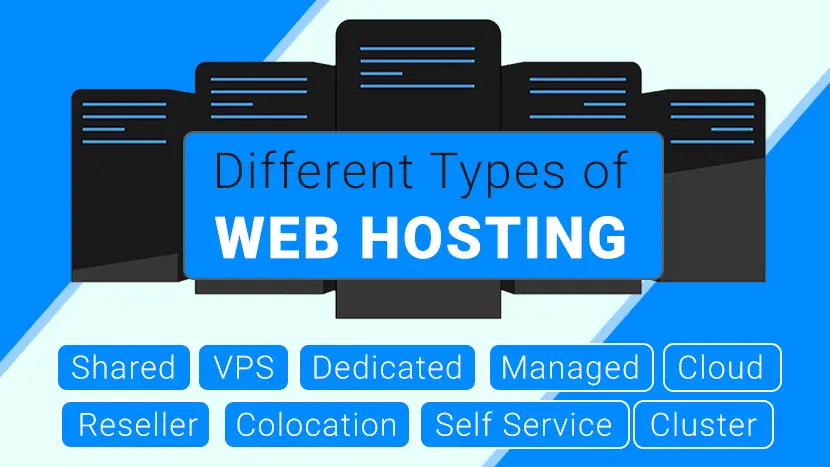
There are different types of web hosting services. So, it can be very difficult to figure out which type of web hosting you need or choose.
In the article, I hope to teach you everything you need to know about web hosting. There are many kinds of web hosting. I can easily see how people get confused so quickly. I will cover the following:
- Shared Hosting — Shared hosting is the most cost-effective plan for entry-level websites.
- VPS Hosting — VPS hosting is for websites that have outgrown shared hosting.
- WordPress Hosting — WordPress hosting optimized for WordPress sites.
- Dedicated Hosting — Dedicated hosting is Enterprise-level servers for large websites.
- Cloud Hosting — Cloud hosting is best for websites that are growing rapidly.
- Reseller Hosting — Reseller hosting is for agencies, web developers, and web designers.
- Managed Hosting — Managed hosting is an IT hosting model in which the client leases servers or cloud computing resources.
- Colocation Hosting — Colocation hosting is where you rent space for your IT hardware at a 3rd party provider’s data center facility.
- Self Service Hosting — Self hosting is a form of running your own website or application by setting up a server and network yourself.
- Cluster Hosting — A Cluster hosting is a host that is configured to take over the role of another host server within a cluster.
Shared Hosting
Shared hosting is a type of web hosting where a single physical server hosts multiple sites. Many users utilize the resources on a single server, which keeps the costs low. Users each get a section of a server in which they can host their website files. Shared servers can host hundreds of users. Each customer using the shared hosting platform’s server has access to features like databases, monthly traffic, disk space, email accounts, FTP accounts and other add-ons offered by the host. System resources are shared on-demand by customers on the server, and each gets a percentage of everything from RAM and CPU, and other elements such as the single MySQL server, Apache server, and mail server.
VPS Hosting
VPS is short for a Virtual Private Server. VPS hosting is one of the most popular hosting services you can choose for your website. It uses virtualization technology to provide you with dedicated (private) resources on a server with multiple users.
It’s a more secure and stable solution than shared hosting where you don’t get a dedicated server space. However, it’s smaller-scale and cheaper than renting an entire server.
VPS hosting is usually chosen by website owners who have medium-level traffic that exceeds the limits of shared hosting plans but still don’t need the resources of a dedicated server.
WordPress Hosting
WordPress hosting is just hosting that has been optimized to better meet WordPress’ performance and security needs. It also typically includes one-click WordPress installs to make it easy to get started with WordPress. And some WordPress hosts will even automatically update your WordPress software as needed.
Dedicated Hosting
Dedicated hosting is a term used to describe web hosting packages that provide a dedicated server with dedicated resources to a single client. Dedicated hosting plans are ideal for WordPress websites with a very large number of visitors. Many WordPress hosting service providers offer Dedicated Hosting plans along with shared and VPS hosting plans.
Cloud Hosting
Cloud hosting is a type of web hosting which uses multiple different servers to balance the load and maximize uptime. Instead of using a single server, your website can tap into a “cluster” that uses resources from a centralized pool. This means that even if one server fails, another kicks in to keep everything running.
Visualize the cloud as a web of different computers which are all interconnected. As more machines are hooked up to the network, more resources are added to the overall cloud.
With cloud hosting, you get a part of the so-called cloud cluster. As opposed to traditional web hosting, where you get a certain amount of space from a single server.
The main benefits of cloud hosting include a major focus on uptime, isolated resources, easy scaling, and a dedicated IP address.
Reseller Hosting
Reseller web hosting is an option that involves one company (a hosting provider) renting hard drive space and bandwidth to another company (small-midsize business), who then rents the space to third parties (entrepreneurs-small business). Simply put, reseller hosting is the ability to provide hosting to your own clients as if you yourself were the web hosting company. This is typical for aspiring entrepreneurs who want to start their own web hosting firm or for current web developers and designers who desire to add additional services to their brand.
Managed Hosting
Managed dedicated hosting is an IT service model where a customer leases dedicated hardware from a managed hosting services provider. This solution includes servers, storage, and networking hardware. Because you aren’t sharing these resources with anyone else, it’s referred to as a single-tenant solution.
When you choose managed dedicated hosting, you get to choose your operating system while your service provider handles the administration, management, and support of your solution. And because you’re not sharing any of these resources with another tenant, you have access to the full performance capabilities of the hardware you’re leasing.
Colocation Hosting
Colocation hosting is a type of service a data center offers, in which it leases space and provides housing for servers. The clients own the servers and claim full authority over the hardware and software. However, the storage facility is responsible for maintaining a secure server environment.
Colocation services are not the same as cloud services. Colocation clients own hardware and lease space, with cloud services they do not have their hardware but lease it from the provider.
Colocation hosting should not be confused with managed (dedicated) services, as the second implies the data center also assumes management and maintenance control over the servers. With colocation hosting, the clients are the one who is responsible for supplying, maintaining, and managing their servers.
Self Service Hosting
Self-service web hosting is done completely on your own. This is the most advanced web hosting. You need to have a place to rent that stores your server. Then you’re responsible for the cooling, power, bandwidth, hardware, system administrator, backups, etc.
Cluster Hosting
Cluster hosting is sometimes confused with Cloud or Grid hosting. It is simply a group of servers that operate together and act as one “mega” server. The big difference between cluster hosting and cloud hosting is cluster hosting is over a smaller area. For instance, there could be a cluster of servers along the eastern coast of the United States.
Cluster hosts are typically billed on an hourly or monthly rate.
List of Popular Web Hosting Service Providers:
Read More : You can explore here 30+ Best Web Hosting Providers
Video - Best Web Hosting For Small Business
Affordable Website Hosting for your domainIf you found this article helpful, we encourage you to share it on your social media platforms—because sharing is caring! For more information about article submissions on our website, feel free to reach out to us via email.
Send an emailWritten by RGB Web Tech
Latest Technology Trends
Latest technology trends shaping the future, including AI advancements, blockchain innovation, 5G connectivity, IoT integration, and sustainable tech solutions. Explore breakthroughs in quantum computing, cybersecurity, augmented reality, and edge computing. Stay ahead with insights into transformative technologies driving innovation across industries and revolutionizing how we live, work, and connect.
GoDaddy Web Hosting Review
Last updated on January 19, 2025 by RGB Web Tech

GoDaddy Inc. is an American publicly traded Internet domain registrar and web hosting company. Its headquarters is in Scottsdale, Arizona, and incorporated in Delaware.
The Best Website Hosting providers will not be complete without mentioning GoDaddy, which is also known for their affordable website hosting plans. At only $1 per month, you will get not only website hosting but even free domain registration. They have global data centers, which can assure that speed will not be an issue. Plus, they are also guaranteeing 99.9% uptime. The cheapest plan also comes with unmetered bandwidth, 100 GB of storage, and a free domain when you sign up for the annual plan.
GoDaddy Hosting Features
GoDaddy’s platform is optimized for WordPress, with high-performance features like load-balanced servers. WordPress Hosting from GoDaddy uses servers modified to ensure WordPress websites run smoothly.
Their WordPress search engine optimization (SEO) plugin reviews pages and automatically handles basic SEO needs so search engines can easily find their client’s website. This service includes a security feature that finds and removes malware before it does damage available in their Ultimate and E-commerce hosting plans.
1. Easy-to-use Control Panel : Includes industry-standard cPanel to install apps, manage backups and security.
2. 1-click install of over 150 Free Apps : Provides access to over 150 free apps to create CMS sites (WordPress, Joomla), forums and blogs through Installatron.
3. 24/7 Network Security : Offers peace of mind, knowing network security and DDoS protection is monitored around the clock.
4. Resources on-demand : If you require more power for your site, seamlessly increase your CPU/RAM, I/O, and storage with a 1-click purchase.
5. Global Data Centers : Gives faster page loads and a better visitor experience with nearby, state-of-the-art data centers in North America, Europe, or Asia-Pacific.
6. 1-click Domain Name Setup : GoDaddy registered domain links your site to your domain name.
Pros and Cons of GoDaddy Web Hosting
There’s no question GoDaddy is one of the biggest names out there as far as how recognizable it is. It also houses the most domains globally, with over 17 million domain names on its roster.
Still, there are pros and cons to choosing GoDaddy as your web hosting provider. Here are the more prominent ones to take into account.
Pros
1. 24/7 Support : GoDaddy ensures it’s always within reach if you ever need a hand or run into trouble with your site. You can either reach them by phone or use its handy chat support option.
2. Lots of Storage : When you look through and compare GoDaddy’s hosting plans, it’s generous with its unmetered bandwidth feature for all tiers.
3. Affordable .com Domain : GoDaddy offers you the chance to snag a domain for only 99 cents for the first year, which can save you money as you begin.
4. Unlimited Site Hosting : Most GoDaddy plans let you host an unlimited number of websites except for its cheapest Economy plan.
5. Convenience : Since you can manage your domain and website in one place, GoDaddy offers convenience in managing both from one dashboard.
Cons
1. Constant Upsells : GoDaddy is notorious when it comes to its upsells through every step of the checkout process. While it does honor the prices for each tier if that’s all you’re going for, it’s quick to suggest add-ons and extra features you might not need.
2. Expensive Renewal Rate : This is one of the reasons why I think GoDaddy is great for beginner sites that just want to get their foot in the door with hosting. Once that initial year is up, GoDaddy’s renewal rates can start to get costly for what you get.
3. Charges for Add-ons : Other hosting providers throw in free first-year domain registration, for example, or include free SSL certification as part of its plans. GoDaddy does not always include these features depending on the plan you choose and can charge extra for them.
4. Inconsistent Customer Support : Support for GoDaddy isn’t always top-notch as convenience and reliability are concerned. There is always the possibility of long wait times to be connected to the right person.
FAQs - GoDaddy Hosting Review
1. Who owns GoDaddy?
Answer : GoDaddy was founded by Bob Parsons. About 70 percent of GoDaddy was sold to a private equity consortium several years ago, and the company has since gone public on NASDAQ with the stock ticker GDDY.
2. Where are GoDaddy servers located?
Answer : GoDaddy owns a massive 320,000 square feet data center that is located in Phoenix Arizona. The company also has data centers in Los Angeles, Chicago and Ashburn, Virginia, along with international facilities in Amsterdam and Singapore.
3. Does unlimited hosting mean what I think it means?
Answer : Yes and no. Shared plans do come with unlimited storage, but you are limited to 250,000 files/folders (and each email counts as a file). Furthermore, there are certain “soft” caps on other resources — if your usage exceeds these caps, GoDaddy may throttle the resources available to your website and, in extreme cases, may even prevent your use of the resources, leading to site downtime.
4. What kind of customer support do I get?
Answer : How do I contact GoDaddy’s support? You get first class 24/7 customer support via phone, live chat.
5. What are GoDaddy’s nameservers?
Answer : If your domain name is registered someplace else (for example with Namecheap) then you need to update the domain’s nameservers. You will find the correct NS values in your control panel. For example, GoDaddy’s default DNS nameservers look like: ns01.domaincontrol.com and ns02.domaincontrol.com. Their premium DNS nameservers look like: pdns01.domaincontrol.com and pdns02.domaincontrol.com.
6. How do I request a refund?
Answer : You can contact GoDaddy using live chat (Live chat can be launched via the “Chat with us” button on their website) or phone. To request a refund go to the “Contact Us”, select your country and perform a toll-free phone call.
7. What if I decide to cancel my hosting package with GoDaddy?
Answer : GoDaddy offers a money-back guarantee however it is related to the length of your web hosting plan. So do read the fine prints. However, you do qualify for a 45-day money-return guarantee if you have selected their annual plan.
8. What features does GoDaddy's website builder offer?
Answer : First of all, you’ll find many free templates to start customizing your website with. You’ll also find a nice library of 8,700 free photos. Another feature you can add to your website is a shopping cart. If you’re really short on time, GoDaddy’s Website Builder offers you pre-built websites with pre-written words and pictures. It just takes a mere 5 minutes to perform a tweak and you’re good to go.
9. What is GoDaddy’s cheapest hosting plan?
Answer : GoDaddy’s cheapest hosting plan is $2.99 per month and it comes with unlimited bandwidth and 100 GB storage and a free domain (for the first year) is included with the purchase.
10. Can I automatically install WordPress/automate WordPress installation?
Answer : WordPress installation is manual (though easy), but GoDaddy provides you with a WordPress managing tool suite, which automatizes your WordPress site backups and software updates. GoDaddy also enhances the performance of your WordPress website and offers you 24/7/365 specialized tech support. Managed WordPress plans come with the WordPress core pre-installed.
11. Which GoDaddy plan is best for WordPress sites?
Answer : The best plan for self-hosted WordPress users depends on the total number of sites hosted. Although the Developer plan is the most expensive one, it’s meant for people who own 5 websites and have up to 800,000 monthly visitors. On the other hand, the Ultimate plan can handle one or two WordPress sites, and 400,000 monthly visitors. It also includes malware protection.GoDaddy also offers managed WordPress options, which include bonuses like WordPress installed by default, staging areas, and dedicated phone support lines (no live chat, though).
Alternatives - Web Hosting Providers
If you want to explore more web hosting plans, here is some web hosting services provider companies as below:
Read More : You can explore here 30+ Best Web Hosting and Domain name Providers 2023
Video - Best Web Hosting For Small Business
Affordable Website Hosting for your domainIf you found this article helpful, we encourage you to share it on your social media platforms—because sharing is caring! For more information about article submissions on our website, feel free to reach out to us via email.
Send an emailWritten by RGB Web Tech
Latest Technology Trends
Latest technology trends shaping the future, including AI advancements, blockchain innovation, 5G connectivity, IoT integration, and sustainable tech solutions. Explore breakthroughs in quantum computing, cybersecurity, augmented reality, and edge computing. Stay ahead with insights into transformative technologies driving innovation across industries and revolutionizing how we live, work, and connect.
Hostinger Web Hosting Review
Last updated on January 19, 2025 by RGB Web Tech

Hostinger is known for its inexpensive shared, cloud, and VPS hosting. All of their plans come with a 30-day money-back guarantee and a free website builder. Do these low-cost plans scrimp on features? Let’s take a closer look at Hostinger’s server speeds, performance, ease-of-use, and customer service.
Hostinger may be best known for its deeply discounted hosting. These Hostinger hosting plans are incredibly cheap compared to industry averages. All plans come with a 30-day free trial.
Hostinger provides free SSL certificates on all plans except for the entry-level Single Shared Hosting plan. SSL certificates are a must for all sites. Browsers may mark your site as ‘unsafe’ if you do not have an SSL certificate. Many hosting companies charge extra for SSL certificates.
Features
- Free Domain (₹679.00 value)
- Free SSL (₹855.00 value)
- Free Email
- 200 GB SSD Storage
- ~100000 Visits Monthly
- 30 Days Money Back Guarantee
- Daily Backups (₹660.00 value)
- Free CDN (₹545.00 value)
- Cloudflare Protected Nameservers
- 24/7/365 Support
- 99.9% Uptime Guarantee
- Unlimited Bandwidth
- Managed WordPress
- Unlimited Databases
- DNS Management
- 100 Websites
- 100 Subdomains
- Unlimited FTP Account
- Unlimited Cronjobs
What Are the Pros and Cons of Hostinger?
Pros
- Comprehensive knowledge base.
- User-friendly control panel.
- Competitive Pricing.
- Multiple Data Centers.
- Excellent onboarding.
- Free nightly backups.
- 30-day money-back guarantee.
- Free SSL & Domain name on entry-level plan
Cons
- Inconsistent website speed.
- Refund exceptions.
- Limited Support.
How is Hostinger’s Performance and Uptime?
Hostinger provides good server response speeds. Over the period from April 2019 through June 2019, our tests showed an average response of 509 ms.
Hostinger uses various technologies to boost site loading speeds, including:
1. SSDs: Solid-state drives are faster and more reliable than HDDs (hard-disk drives).
2. HTTP/2 and HTTP/3 (Quic): This is a network protocol that increases speed.
3. PHP 7: Most modern dynamic websites (like those built with WordPress) use the PHP language. PHP 7 provides greater speed and reliability.
4. Litespeed: Litespeed is a brand of web servers known for its speed.
5. GZIP compression: This is a form of file compression used to increase speed.
Uptime refers to the amount of time that servers are up and working correctly from the host’s end. A high uptime indicates that a host is stable, well-built, and can fend off network threats.
Hostinger provides a 99.9% uptime guarantee.
How Does Hostinger Keep Your Site Secure?
Hostinger’s SSL security guarantees lifetime security. Their web hosting plan offers a free SSL certificate to provide a safe online environment as it offers the highest level of encryption and immediate access results. Their servers have advanced security modules (such as mod_security, Suhosin PHP hardening, PHP open_basedir protection, and others) that give the highest security level available today.
Their free SSL certificate will ensure the safety of their client’s data including their clients’ target audience. Hostinger’s SSL for WordPress will also protect their clients’ blogs or e-commerce shops, ensuring the safety and reliability of every online transaction. The encryption, which protects their client’s data from theft and any other malignant act, is the strongest form of encryption in the open market and follows the SSL protocol – a guaranteed security service of Hostinger.
Hostinger’s Cloudflare is a CDN (Content Delivery Network) that not only speeds up your website’s loading speed but also protects it from intrusions and DDoS attacks. All of their hosting plans fully support Cloudflare that establishes a secure connection for sensitive data protecting their clients’ websites. This security service requires an additional fee before setting up.
Does Hostinger Handle Site Backups?
Hostinger provides daily backups with the majority of their hosting plans – the only plans that have weekly backups are their Shared Single and Premium hosting plans.
Their hPanel contains backup features that allow you to backup your files and data You can download both the website files and the database when backing up your site manually. In your hPanel, backups can be made by accessing your Backups option under the Files section. Click on Select near Generate new backup section, give it some time, your new Files and Databases backups will be made.
How is Hostinger’s Help and Support?
Hostinger provides 24/7 support. You have 2 main options.
Hostinger knowledge base – Consists of hundreds of tutorials and solutions to common issues. It’s easy to search, and from what I see, the answers are all easy to understand.
Live chat support – Available 24/7, every day of the year.
Hostinger is also active on social media and usually responds to messages and posts within a few hours.
FAQs - Hostinger Web Hosting
1. Which Company Owns Hostinger?
Answer : Established in 2004, Hostinger now has over 29 million users, collectively with its subsidiaries in 178 countries. Hostinger is the parent company of 000Webhost, Niagahoster and Weblink.
2. Which Languages Does Hostinger Support Team Speak?
Answer : Their customer support provides support in English for all locales. Additional languages they speak are Lithuanian, Portuguese and Brazilian Portuguese, Indonesian and Malaysian, Spanish, Russian, Ukrainian, French, Arabic, Thai, Vietnamese and Chinese.
3. What Kind of Support Do I Get With Hostinger?
Answer : Hostinger offers 24/7/365 support via live chat.
4. Where are Hostinger’s Servers Located?
Answer : Their servers are located all around the world. They have datacenters in Europe (the Netherlands, Lithuania, the United Kingdom), Asia (Singapore), North America (the USA).
5. What is Hostinger's Cheapest Hosting Plan?
Answer : Hostinger cheapest plan is their Single shared hosting package, which costs $1.39 per month.
6. Does Hostinger Have a cPanel?
Answer : Hostinger does not provide the classic cPanel to manage domain and hosting accounts. It has its own control panel, which is known as hPanel.
7. What are the types of web hosting?
Answer : This answer will be different for everyone. It depends on the type of website you have, the resources you need, your budget, and traffic.We gave our top recommendation for each category in this guide, so that’s the best place for you to start your search.Once you know what you need, you can narrow your options. To figure out what category you fall in, here’s a quick recap of the different hosting types
Conclusion
Hostinger is a user-friendly, secure, reliable, and affordable hosting option, especially if you are just starting out with your website.
Alternatives - Web Hosting Providers
If you want to explore more web hosting plans, here is some web hosting services provider companies as below:
Read More : You can explore here 30+ Best Web Hosting and Domain name Providers 2023
Video - Best Web Hosting For Small Business
Affordable Website Hosting for your domainIf you found this article helpful, we encourage you to share it on your social media platforms—because sharing is caring! For more information about article submissions on our website, feel free to reach out to us via email.
Send an emailWritten by RGB Web Tech
Latest Technology Trends
Latest technology trends shaping the future, including AI advancements, blockchain innovation, 5G connectivity, IoT integration, and sustainable tech solutions. Explore breakthroughs in quantum computing, cybersecurity, augmented reality, and edge computing. Stay ahead with insights into transformative technologies driving innovation across industries and revolutionizing how we live, work, and connect.
What is Linux web hosting?
Last updated on January 19, 2025 by RGB Web Tech

Linux hosting is an open source operating system where web hosting services occur with the use of a Linux-based server.
Linux web hosting can be accessed by an organization or individual, and it’s generally one of the cheapest types of hosting services for small businesses.
It's user friendly and generally offers a high level of security, with many hosting companies sharing their hosting tools according to each customer’s requirements.
Linux web hosting allows its users to share between multiple servers, and the source code can be used, modified, and redistributed freely in both commercial and non-commercial capacities.
Users of Linux often rely on cPanel to manage web development tasks and some web hosting providers include cPanel in its packages despite it being a third party application.
Advantages of Linux Hosting
- Linux hosting provides flexibility and use of open source technologies such as Apache, PHP, and MySQL.
- This hosting service is one of the most reasonable and affordable options.
- Over the years, Linux has earned a reputation for stability and safety.
- The security settings on the Linux server are highly efficient and advanced when compared to a Windows platform.
- In the current technology world, versatility is highly desirable because it ensures relevance in an ever-changing playing field. Linux hosting is versatile because it is compatible with various databases.
Disadvantages of Linux Hosting
- Linux web hosting lacks compatibility with several of the primary Windows-based scripting applications and technology.
- Certain programming languages such as ASP and its extensions are not suitable on Linux operating systems.
- Linux servers are not useful for porting of websites that have been scripted or designed for a Windows environment or background.
Web Hosting on Linux
When you are planning to create a website, a web hosting package should offer various features. Some of the necessities to consider are bandwidth, domain, and affordability. Domains are necessary for hosting a professional internet site. As the site develops and grows, bandwidth becomes necessary as more information and functions increase. The market has many different companies that offer Linux and Windows hosting packages. Linux web hosting is the more practical and affordable choice because it is not restrictive and is more adaptable.
However, internet marketing requires a proper analysis of the needs of the business for the present and future. You can opt for a cost-effective Linux hosting package, make sure that it contains all the functionality required currently and in future. Additional features such as software and web-mail are important for websites as they develop and grow.
Differences Between Linux and Windows Web Hosting
As previously stated, the Linux hosting system has multiple features such as good performance, adaptability, cost effectiveness, security, stability and so on. Likewise, the Windows web hosting has its own features and strengths that are better suited for specific files and websites.
The main difference between the two is the type of files and functionalities that is used. A website needing PHP, Perl, WordPress, MySQL, SSH and applications that require specific Apache modules run better and more quickly on Linux-based web hosting because it is specifically designed for this type of data. On the other hand, a Windows platform is ideal to host ASP Classic, Microsoft Access, ASP.NET, Microsoft SQL Server, C# or Visual Basic Development.
The price is another big difference. Because Linux web hosting is more reasonably priced, it is the more popular option among web hosting providers. The Linux web hosting platform also has more features than Windows, making it many web designer’s preferred choice.
Additionally, the two web hosting services have the following different servers and control panels:
- cPanel and Web Host Manager (WHM) are used on Linux-based hosting such as VPS, Linux Reseller and Linux Dedicated Servers.
- Plesk can be used for Windows Shared and Dedicated Servers.
Both systems need, use and store files. While Linux file names are case sensitive, Windows files are not. For example, home.html and Home.html are names of two different files on a Linux server, whereas, on a Windows server, whether it is home.html, Home.html or HOME.HTML, all files are considered the same.
While Linux hosting is considered more secure, both Linux and Windows operating systems are safe. The security is mainly reliant on the setup and administration of the server. Hosted servers typically are maintained with the current security and performance patches.
Ultimately, the decision to pick one web hosting service over the other often boils down to which one offers the best necessary capabilities specific to the user. The user interface on a Linux hosting account is the same as that on a Windows account. However, users are sometimes apprehensive about using a web host system that is different from the system of the home computer as they feel it may cause usability issues. It is a misconception that using a web host system that is different than a home computer can cause usability issues. Linux websites needs specially written code to run that is usually not related to the applications operating on a home computer. HTML files are used and read by both platforms and regular websites function with the same level of performance.
Linux web hosting services have various good attributes and performance capabilities and each website or designer has its own specific needs and techniques where one or the other platform can be more suitable. In order to understand whether Linux web hosting is best for you, or to gain better knowledge and insights specific to your business needs, Flying Cow Design can provide information and guide you in a step-by-step manner to better assess how to make the right decisions for your business.
List of Linux Web Hosting Service Providers:
Read More : You can explore here 30+ Best Web Hosting Providers 2023
Video - Best Web Hosting For Small Business
Affordable Website Hosting for your domainIf you found this article helpful, we encourage you to share it on your social media platforms—because sharing is caring! For more information about article submissions on our website, feel free to reach out to us via email.
Send an emailWritten by RGB Web Tech
Latest Technology Trends
Latest technology trends shaping the future, including AI advancements, blockchain innovation, 5G connectivity, IoT integration, and sustainable tech solutions. Explore breakthroughs in quantum computing, cybersecurity, augmented reality, and edge computing. Stay ahead with insights into transformative technologies driving innovation across industries and revolutionizing how we live, work, and connect.
What is Windows Web Hosting?
Last updated on January 19, 2025 by RGB Web Tech
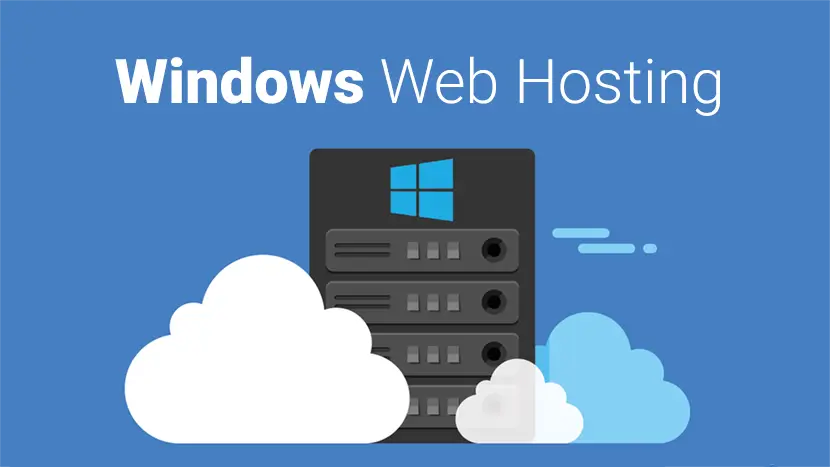
The necessity of having a dynamic website with visually attractive elements has now become an essential factor for many individuals. Windows web hosting is one of the most popular and feature-rich services offered by hosting companies that meet these needs markedly.
Generally speaking, there are two main options available for web hosting: Windows and Linux. Windows hosting with its dynamic technology can help you stay ahead of the competition with eye-catching pages that run smoothly.
What Is Windows Hosting Meaning?
It is typically a web hosting server that runs by the Windows OS or its other variants. Your website pages can efficiently have access to web development features of Windows when you use a hosting service of this kind.
The popularity of Windows as an operating system around the world has paved the way for windows hosting meaning to become hugely favorable among website owners. Currently, more than 75% of the desktop operating system’s global market belongs to Windows. Microsoft is continually researching this product, and we can see the improvements it makes on Windows every year not only in the technical aspects but also in support of various scripts.
Advantages of Windows Web Hosting Hosting
When you are looking for a hosting solution, you will come across numerous options. Windows hosting holds a prominent place among them. If you are looking for a feature-rich hosting solution, you may take a look at this type of hosting. However, it is better to evaluate its pros and cons before you proceed.
1. A Microsoft-Friendly Option
Many websites and businesses rely on different products and tools of Microsoft like FrontPage and ASP to function properly. The same conditions apply to Microsoft Exchange for efficient management of emails and Microsoft SharePoint for better collaboration between team members.
These products offer excellent quality and have proved to be the best option in their category. For instance, ASP is much easier to use than other server-side services and integrates perfectly with many other languages as well.
Therefore, windows shared hosting counts as a perfect solution for this purpose that provides you with enough capabilities to build dynamic and interactive websites. Moreover, many tech professionals are accustomed to maintaining and updating windows and its programs. This familiarity with Windows OS makes it easy for them to work with the server interface, too.
2. Powerful and Simple
Windows hosting services are often based on Windows Server OS. This operating system enables you to manage your server and scale it without any concerns about its security.
Additionally, these windows website hosting packages come with the user-friendly Plesk control panel that makes it much easier for you to update your website and make changes where needed. The intuitive interface of Plesk, with its great focus on commercial websites, lets you manage multiple sites conveniently. Plus, it’s completely compatible with the most popular content management systems, including WordPress and Joomla.
Above all, all the Microsoft products are developed in a way to support one another. This advantage has attracted developers towards creating various applications in complete compatibility with Windows. Similarly, open-source tools like MySQL and PHP run efficiently on this hosting platform, and this feature isn’t available on Linux to this extent.
3. A Reasonable Solution
It used to be a costly service due to the high price of Microsoft licenses. However, these days you can find affordable plans as low as $10 a month from different service providers. Although Windows hosting packages are costlier than Linux, compared to the features you receive in return for the budget, you can rest assured that your money is spent well.
4. It Runs on Windows Operating System
Most of us are familiar with Windows operating system which windows shared hosting runs on it. Hence, you don’t have to go through the struggle of getting used to it. In other words, you don’t have to go through a lengthy learning curve while you are trying to work with this hosting solution. You will find specific features, which you can use according to your preferences. On these plans, you will discover the Plesk control panel. This delivers an intuitive experience than cPanel, which you can find in Linux hosting.
5. It Is Compatible With Other Windows Tools
One of the main reasons why people go for this type of hosting is the presence of numerous familiar tools. This makes life easy for them when managing the hosting plan. For example, if your website is developed with ASP.NET, Windows hosting would be a great solution available to consider. On the other hand, you will notice how compatible your hosting plan with Microsoft SQL is. You might even be able to use Microsoft Exchange as the email server.
6. It Comes With a Plesk Control Panel
As mentioned earlier, hosting windows server comes with a Plesk control panel. You can access straightforward controls on this control panel. Hence, managing your hosting plan will never be a challenging thing. If you want to make any changes or updates to your website, you can easily do them. You will even be able to manage multiple domains and websites in your hosting solution without a problem.
Disadvantages of Windows Hosting
1. It Is Not Secure as Linux Hosting
When you make a cross-comparison between the security of Windows hosting and Linux hosting, you will notice some significant differences. In other words, Linux hosting is more secure. Windows hosting solutions are highly vulnerable to numerous attacks, including ransomware attacks. However, Linux hosting is more confident, and you will keep peace of mind. Since security is a significant concern, you must be mindful of this fact as you pick a hosting solution.
2. It Is Expensive
You will have to spend more money to get this type of hosting when compared to Linux hosting. However, this varies depending on the hosting solutions provider. For example, if you look at Hostgator, you will notice that Linux hosting plans start at $2.75 per month, whereas Windows hosting plans start at $4.76 per month. You will be able to save money in the long run by going ahead with Linux hosting.
3. It Is Less Stable
Linux servers are well-known for their dependability. They seldom need to be restarted and can perform many tasks at once. On the other hand, Windows servers have difficulty running many programs and processes simultaneously without crashing. Like any other web technology, Windows servers have improved over time and are anticipated to continue to do so. However, they aren’t relatively as constant in their performance as Linux servers.
However, this is another area where selecting the appropriate web hosting company may make a significant impact. When a Windows hosting business offers a 99.9% uptime guarantee, it means they’ve taken all the necessary steps to keep their Windows servers running as smoothly as possible. A competent web hosting company can assist overcome the gap in server stability between Windows and Linux hosting by paying attention to maintenance and planning.
Who Should Choose Windows Web Hosting Server?
Windows hosting, compared to its Linux counterpart, has many areas with exceptional strength that makes it a perfect match for a hosting service. It’s essential for some web programming languages and scripts such as ASP, Visual Basic, and C# to work seamlessly.
Additionally, it supports commonly-used databases like SQL and MS Access so that you won’t have any difficulty managing your database.
Frequently Asked Questions
Does Windows Hosting Support WordPress?
One of the common questions among users is “can you host WordPress on a Windows server?“. Microsoft provides a set of tools and a robust platform that is capable of hosting WordPress. One of the most important things about Microsoft’s web platform is its interface. The Microsoft Windows server family provides several roles which can take control of complicated IT tasks.
Does Windows Hosting Support PHP?
The answer is yes. Most shared hosting services of windows support PHP by default. If PHP is not enabled on your host, you should ask your hosting provider to activate it for you.
Conclusion
We know what is windows web hosting. Windows shared hosting is an excellent option for a broad range of requirements. Although you will need to pay more money compared to the Linux solution, the efficiency and advantages of windows web hosting will outweigh its costs. So if you want high functionality and integration with popular applications, don’t hesitate to go for this service.
List of Windows Hosting Service Providers:
Read More : You can explore here 30+ Best Web Hosting Providers 2023
Video - Best Web Hosting For Small Business
Affordable Website Hosting for your domainIf you found this article helpful, we encourage you to share it on your social media platforms—because sharing is caring! For more information about article submissions on our website, feel free to reach out to us via email.
Send an emailWritten by RGB Web Tech
Latest Technology Trends
Latest technology trends shaping the future, including AI advancements, blockchain innovation, 5G connectivity, IoT integration, and sustainable tech solutions. Explore breakthroughs in quantum computing, cybersecurity, augmented reality, and edge computing. Stay ahead with insights into transformative technologies driving innovation across industries and revolutionizing how we live, work, and connect.
What is Shared Web Hosting?
Last updated on January 19, 2025 by RGB Web Tech

Deciding on the hosting service for a website can be tough. Hosting service providers offer different packages and plans, which can leave you confused about which one to choose. To hit the right note, you should gain information about different types of hosting plans and pick the correct one based on your needs.
Shared web hosting can be a good choice when your website is still in its infancy and has not been expanded to require specific resources and access. But in most cases, there is a day when shared hosting will no longer meet the needs of your website. The advantages of shared hosting and also disadvantages of shared hosting can make them a viable choice or a troublesome limitation depending on your circumstances and needs. In the remainder of this article,
Here we discuss what is shared hosting that comes as a popular choice for many users launching their first website. In the following paragraphs, we will examine shared hosting pros and cons to determine the strengths and weaknesses of this type of hosting.
What Is Shared Hosting Meaning?
Shared hosting means are the most affordable option to use for running a website. As a shared web hosting definition, multiple sites share a single server when they run on shared hosting. That’s the reason why these services come at a lower price compared to the dedicated ones.
In most cases, the user doesn’t know other users who share the server. But, all users have access to the platform of the server to see the databases, find out about email accounts, and access other provided features. The allowed capacities are limited by the service provider, which is often described in the details of the package you buy.
Generally speaking, a shared hosting server is proper for a personal weblog, startups, local businesses, or other small websites that don’t need very high bandwidth or professional settings. Websites with high volume should go for VPS or other dedicated options available on the market. Owners of these sites can take advantage of more in-depth controls and more stable performance if they choose plans with higher prices than the shared hosting. In the past article, we have mentioned the advantages of shared hosting.
How Does Shared Hosting Work?
Shared hosting plans are cheap and affordable. Before you go ahead with it, you will come across the need to figure out what is shared web hosting and how it works. Shared hosting is where you will be provided with hosting space in a server, which hosts multiple other websites. It can even contain hundreds or thousands of websites. The server resources, including processing speed, RAM, and hard drive space, are shared between all the websites hosted. Due to the same reason, the performance of your website hosted on the shared hosting server can be affected by another website’s performance on the same server. This is something that you will need to be mindful of.
Advantages of Shared Hosting
Now you have answers to the question of what is shared hosting. There are some drawbacks and benefits of shared web hosting that you must know before deciding whether or not to use this kind of web hosting. In the following, we are going to mention some of the benefits first:
1. Cost-Effective: One of the advantages of shared hosting is being cheap; shared hosting services are the cheapest type of hosting services you can supply. In this type of service, the resources of a server are divided into several hundred or even several thousand websites. As a result, the cost per user is significantly reduced. The pricing plans you find for these services fall somewhere between $2.5 to $10 per month.
2. Simple User Interface: One of the main benefits of shared hosting is a simple user interface. Shared hosting is generally managed by control panels. This means that when you purchase the service, you are provided with a web interface with the ability to make changes, upload, create a site and add domains, and more. Due to the simple user interface in these types of management panels, you no longer need to have high knowledge of Linux or Windows servers and can use your service without paying attention to the details. The control panels provided on these services are generally Plesk, Cpanel or Solidcp.
3. Security : As with other shared hosting services, security is of particular importance. If there is a security problem with these types of services, this deficiency can cause problems for a large number of services running on that server or all of them. For this reason, companies offering these types of services are particularly sensitive to their security checks and even to the limitations of protecting users, so you don’t have to worry about security. Periodic server updates, data backups, restrictions on service changes, and the inability to use some protocols are security issues that generally apply to these services.
4. Support : One of the main shared hosting benefits is that it does not require server management. As mentioned above, server-side security issues are controlled by the provider on an ongoing basis in shared services. But security reviews are not the only things that need to be done to make a service sustainable. Hosting networks are generally complex systems, and because of this complexity, the possibility of disruption or a technical difficulty is very high. Investigating and resolving such cases can, in many cases, require increased knowledge and hours, or even days. It is up to the server to monitor and resolve such problems in shared services.
Technical support is another strength and benefit of shared web hosting that can, in many cases, make your work easier and return valuable hours to you. Generally, quality hosting services provide relatively extensive technical support. The technical teams prevent the services from being interrupted by a 24-hour review and investigation of the services and will resolve the interruptions as soon as possible. More importantly, you can contact your hosting service support experts at any time in different ways to investigate and troubleshoot any issues that may arise on these services.
5. Scalable : Scalability is among the important advantages of shared hosting. Since new and small sites don’t see much traffic, shared hosting works best for them. This feature allows them to remain within limits established by many users drawing from a shared server’s finite resources. In fact, shared hosting solutions are not just for personal website owners and casual bloggers. It can handle up to 100,000 visitors a month, translating to roughly over 3000 visitors daily. When a website gets to a certain level of monthly traffic, it may need to upgrade to a different rank of shared hosting or switch to another hosting entirely.
In sum, shared hosting services may require you to hire a server administrator to maintain the service. This type of support and management of service is generally not provided on virtual servers or will be significantly limited.
6. You Can Host Multiple Domains : You can have multiple domains under the user directory while using a shared hosting plan. The hosting provider will deliver a convenient interface, which you can use to manage all the websites. This interface can help you to overcome complexity in managing multiple websites.
7. It’s Professionally Managed : The maintenance cost associated with shared hosting is low. In fact, you will be able to manage the website as well professionally. All you have to do is seek the assistance of a professional team and hand over the job to them.
8. It Can Host Dynamic Websites: Dynamic websites are the websites that change dynamically based on how a user is browsing. Quora, Facebook, and Twitter are perfect examples of such dynamic websites. They are usually based on content management systems. You can easily host a dynamic website within your shared hosting plan.
Disadvantages of Shared Hosting
We have mentioned some benefits of shared hosting. There are also some factors that explain why shared hosting is bad for some businesses:
1. Resource Constraint : In shared hosting, the resources provided to your site are limited, and the overall server resources are shared among all users; this is one of the leading shared hosting drawbacks. Resource constraints become more critical when your site expands and needs more resources to operate. Lack of resources can severely impact your site’s performance, slow down the site, or interrupt loading. If the site in question uses more resources than what is specified by the server, access to the service may be restricted by the provider rules.
2. Lack of Full Access : One of the main Disadvantages of Shared Hosting is a lack of access. As mentioned earlier, shared hosting services have limitations on the amount and type of user access to server settings. This could be due to security issues or the impact of changes to other users’ services. If you need to make any changes to the server for any reason, you should discuss this with the server to make these changes if possible. In many cases, such changes cannot be made to these services. In fact, you do not have much authority for changes in shared services.
3. Influenceable : Shared services generally have a lot of investigations to control the quality of service. Different websites operate typically in the range of resources provided to them, using the Isolated Application Pool, which essentially prevents over-consumption on one website and affects it on other websites. However, there are other problems that if happen to other websites, can negatively impact your website.
For example, sending spam by a website can place the IP of the email service in the RBLs (which collect the IP of the spam senders). Since IP is shared in these services, this can also affect sending emails by your domain, and your sent emails are known to be spam.
4. Less Stable : Technologies such as cloud hosting, load balancing, and redundancy have greatly increased the ability of servers to provide more stable services. However, shared services are still less stable than dedicated services. The issues mentioned in previous sections are among the reasons that influence the sustainability of shared services. If your website requires a very high level of service sustainability, even the best-shared services may not meet your needs.
5. Insufficient Support: Insufficient support is one of the big shared hosting cons. Shared hosting companies often assert to provide easy support, but this support might not be enough. In other words, if the website meets head-on a problem, they might not be able to help you with that. If your problem goes under, they will just restart it for you.
If you ask why it continues going under, they might be unaware. And in the end, you might soon find out that you are talking to someone who is not a professional WordPress pro, but instead someone who is a newcomer and is reading from a prepared FAQ. If you have bigger problems, you have to call an expert help from outside, which could cost a lot for you.
6. More Vulnerable Against Security Issues : Another disadvantage of shared hosting is vulnerability to Security Issues and because of which you should just stay away from it. If a hacker hacks any website on a server, then other websites also face the potential threat. And if the main server itself gets hacked, then every website on the server threats Simultaneously. So, if you should try to work without mistakes, your website is at risk in a shared hosting environment.
7. Extra Payment For SSL Certificates : In general, you have no problem with the initial cost of shared hosting, because it is not high, but when you want to add a feature, you have to spend more. that is one of the main shared hosting disadvantages. One of these features is SSL certificates. Many shared hosting companies don’t prepare SSL certificates for free, and this causes your website to show a “Not Secure” warning.
However, these certificates are actually available for free. But, you still result up paying for them on shared hosting. So the cost of SSL Certificates becomes one of the biggest shared hosting disadvantages because you have to add up the cost of buying it from shared hosting.
Who Should Buy a Shared Hosting Server?
Overall, for those who are starting a website from the ground up, there is no alternative to shared hosting. It’s by far the best choice for this group of users. Also, shared hosting is the right fit for those who can’t invest much in their hosting and need to keep their costs down. Beginner users with little experience regarding website management who choose Joomla and WordPress cms as their CMS could also benefit from this service extensively. Furthermore, in the beginning, it’s hard to predict how much space and requirements a website needs precisely. To this end, shared hosting is a proper flexible solution that allows you to manage the unknowns easier.
Things To Consider When Choosing a Shared Hosting Plan
Upon understanding what is shared website hosting and the benefits of shared web hosting, you will need to explore the factors that can contribute towards the best results out of your shared hosting plan. Here are some important tips that you need to consider as you try to obtain your shared hosting plan.
1. Uptime : One of the very first things you should do as of now is to take a look at the uptime. If the shared hosting plan is leading you to continuous downtimes, you will end up with struggles. This is why you should be mindful of the uptime. You can then make your website available for visitors at all times.
2. Speed : Next, you should be mindful of safety. No person would like to wait for more than 3 seconds for a page of your website to load. While keeping this in mind, you should pay extra attention to the speed of the website.
3. Security : Shared hosting can be risky as your server will be shared with numerous other entities. This is why you should be mindful of the security of the website. Then you will be able to keep it away from threats.
4. Resources : There should be enough resources available for you to host the website. This is something that you should double-check and see. If not, you will run into struggles because of a lack of resources.
5. Easy to use dashboard : You never expect to go through any struggles when using the web hosting account. This is why you should check and see whether an easy-to-use dashboard is available or not.
6. Support : Last but not least, you need to make sure that proper support is available to you. Then you can get answers to all the questions you have promptly.
When we not use Shared Hosting
Your site is facilitated on a standard server with numerous different sites with shared Hosting. Subsequently, the server is arranged to permit well-known structures, for example, WordPress, to run effectively with traditional settings. To use a custom website system that isn’t introduced on the server or improve server assets for webpage explicit undertakings, it is likely best to use a web hosting or devoted hosting program. These projects require much more information and framework the executive’s experience, yet they permit you to alter the server precisely to your necessities.
Introducing WordPress or utilizing essential coding, for example, HTML or CSS, doesn’t need root access and is effectively finished with the underlying arrangement of a joint facilitating account. Email, essential security strategies, such as ModSecurity, Sucuri, and SSL testaments, likewise don’t need root access and can be applied rapidly without broad information.
Except if you want root admittance to introduce programming or unique settings, shared Hosting is the best spot to begin. Nonetheless, on the off chance that you wish to teach particular programming or set up another server to set up and run your site, consider Hosting a VPS or committed server.
Why Start with Shared Hosting?
Shared Hosting is the least complicated type of web Hosting to begin. Progressed server settings expect you to oversee server assets and upgrade server settings yourself. In a joint program, this is dealt with for you! Likewise, you can pick a joint undertaking with the support that your business needs—that way, you just get compensation for what you use. Assuming you at any point expected to change to a VPS or devoted hosting program, you can undoubtedly overhaul your application to something with more control.
In addition to shared Hosting, it is natural to have numerous destinations simultaneously. cPanel, Softaculous, and other engineer devices simplify the same goals, send off new locales, and attempt new things. You can undoubtedly test on different destinations without influencing your center business. Most independent ventures need a little data site to assist them with building mindfulness and cultivating leads while beginning a site.
Likewise, while sending off a site, traffic will probably be low until the site positions in web indexes. Utilizing a standard Hosting plan at this phase of development will assist you with setting aside cash while distinguishing your image, constructing an internet-based presence, and fostering an SEO technique.
Shared Hosting turns out best for primary, centered sites. Online journals, one-page pages, or destinations that sell a little assortment of items or administrations can all function admirably in shared Hosting. WordPress and other well-known substances the executives programming are frequently excellent for shared Hosting when a site has standard, predictable traffic. Some web-based business stages can, without much of a stretch, sudden spike in demand for shared Hosting, even with a wide assortment of items; however, a few scenes perform better compared to other people.
Frequently Asked Questions
Is Shared Hosting Good?
Shared hosting is a suitable option for small businesses that require small websites. Since every website doesn’t need to use its quota, then it works for most of the small businesses. It is really affordable for such organizations and also profitable for web hosting companies.
Is Shared Hosting Secure?
The answer is yes! Shared hosting has the same amount of security risks as other kinds of hosting. If hackers get the chance to hack your website, they can redirect your users to unwanted pages, display unwanted content and spam the customers.
What Is the Purpose of Shared Hosting?
If you are wondering what does shared hosting mean, we should say that it is a kind of web hosting capable of hosting multiple websites on a single server. In this way, several websites can host their website files and utilize the resources together. As a result, the cost for shared hosting plans is much more reasonable than the other kinds of plans.
If you are interested to compare wordpress hosting vs web hosting , this article can help you!
Is Shared Hosting Slow?
One of the most important shared hosting drawbacks is its speed. The performance of your website highly depends on the activity of other websites which are hosted on the same plan and also by the server infrastructure itself.
How Much Traffic Can Shared Hosting Handle?
Good shared hosting is capable of handling about 1.5–2k traffic per hour. It actually depends on how website owners optimize their website pages. With the average size of 700kb to 1.3 MB of website pages, we can say that shared hosting can handle 7–12 k daily traffic without any problem. But for more traffic, users may experience some slow loading issues.
If you are interested in comparing vps vs vds , this article can help you!
Conclusion
In this article, we have mentioned some of the pros and cons of shared hosting that can affect your business. It is important to choose the right kind of Web Hosting service for your website to attract more users to visit your site and also rank higher in SERP. We hope that this article can help you have a better understanding of shared hosting limitations, pros, and cons!
List of Shared Hosting Service Providers
Read More : You can explore here 30+ Best Web Hosting Providers 2023
Video - Best Web Hosting For Small Business
Affordable Website Hosting for your domainIf you found this article helpful, we encourage you to share it on your social media platforms—because sharing is caring! For more information about article submissions on our website, feel free to reach out to us via email.
Send an emailWritten by RGB Web Tech
Latest Technology Trends
Latest technology trends shaping the future, including AI advancements, blockchain innovation, 5G connectivity, IoT integration, and sustainable tech solutions. Explore breakthroughs in quantum computing, cybersecurity, augmented reality, and edge computing. Stay ahead with insights into transformative technologies driving innovation across industries and revolutionizing how we live, work, and connect.
What is VPS Hosting? - Virtual Private Server
Last updated on January 19, 2025 by RGB Web Tech

A VPS ( Virtual Private Server ) is a virtual machine sold as a service by an Internet hosting service. The virtual dedicated server (VDS) also has a similar meaning.
A virtual private server runs its own copy of an operating system (OS), and customers may have superuser-level access to that operating system instance, so they can install almost any software that runs on that OS. For many purposes it is functionally equivalent to a dedicated physical server and, being software-defined, can be created and configured much more easily. A virtual server costs much less than an equivalent physical server. However, as virtual servers share the underlying physical hardware with other VPSes, performance may be lower, depending on the workload of any other executing virtual machines.
How does VPS work?
If you’re familiar with VMware or Virtualbox, you’ll be familiar with how VPS hosting works. These programs let you run what are known as virtualized operating systems from one machine. For example, your computer might be running OS X, but you could run different systems such as Linux or Windows XP without having to reconfigure or restart your computer.
VPS web hosting environments work in the same way as a virtualized operating system in the sense that one server will run numerous, one of a kind virtualized OS’s on a single server -since each virtualized system behaves as though it is a dedicated server. Virtualization is possible through a hypervisor. A hypervisor is computer hardware, software or firmware that creates and runs virtual machines (VM) by separating the underlying physical hardware from a computer’s operating system and applications. The computer system on which the hypervisor runs is known as a host machine, and each VM is called a guest machine.
The hypervisor provides each guest machine (each website using the VPS) with a virtual operating system and takes care of managing and executing guest operating systems. This process makes the most effective use of computer resources such as network bandwidth, memory space and processor cycles. For this reason, a hypervisor also goes by the name of a virtual machine monitor (VMM).
VPS hosting relies on a hypervisor to take resources from the physical server and provide each website with access to an emulated server (the VM). These physical servers are often held in a data center and divided equally between several virtual compartments (known as server virtualization). Each compartment is rented out, and server software is set-up on them separately so that each unit is capable of functioning as an independent unit. Each individual VPS is called a container, and the server each container is held within is known as a node.
With VPS, you benefit from many of the advantages of a dedicated server for a significantly lower cost. It offers more privileges within the OS and allows users to install any type of software capable of running on that OS. Each virtual server’s software is installed separately, enabling independent functionality for all users.
Defined amounts of CPU time and memory are shared throughout all the accounts sharing the server space. So, despite the fact that there might be far bigger websites than yours on another VPS compartment powered by the same server, that doesn’t matter. You are guaranteed the system resources you are paying for.
VPS is a step up for most users, but you'll also benefit by knowing a bit more about the technology. When your website is stored on a VPS, you are solely responsible for setting up, maintaining and running the server yourself. Handling an internet server is not an easy task! It involves taking care of security patches, server configuration, software updates, and so on. Unless you have the degree of technical skills required, it is going to tricky, and for this reason, there are two versions of VPS hosting – managed VPS and unmanaged VPS.
There are different types of VPS Hosting
Unmanaged VPS
With unmanaged VPS, your web hosting takes over installing the operating system, and you as the site owner take over managing various aspects of the server such as:
- Installing software, your control panel and taking care of software updates.
- Monitoring for security threats, installing security patches and fixing error messages.
- In the event of an outage or hardware failure you won’t get much if any support from your host.
- Configuring and maintaining your server including any upgrades you might want to see.
- You take over the responsibility of setting up your sites backup services.
This is recommended for site owners who have a technical background.
Managed VPS
Site owners with less technical acumen or a smaller staff can benefit from managed VPS. With managed VPS hosting, IT professionals lighten your load by keeping your server running correctly and taking care of your virtual server. Here’s what you should expect from a web hosting provider:
- Initial server setup : When you launch your site with a VPS there are a few steps to take in order to set the server up including installing your control panel, server software and installing any applications and your operating system. A managed host will take care of this.
- Updates : Similarly, all applications and OS updates, and ongoing fine tuning of the server will be handled for you.
- Security Patches : Security patches for your OS and core server software are installed and updated, on your behalf.
- Monitoring : Monitors for early warning signs of hardware failure and malicious attack.
- Automated Backups : In the event anything goes wrong with your site, you can retrieve it back to an earlier version.
Check with your VPS hosting provider to see what levels of management they offer. Some have greater flexibility, like Namecheap; we offer Self-Managed, Managed, Fully Managed and Emergency Assistance.
The tradeoffs between managed and unmanaged hosting are cost vs flexibility. While unmanaged services are, naturally, far cheaper than managed plans, there’s a snag - you need to have the tech know-how to run and maintain a server, or be prepared to hire someone to keep it running smoothly and safe from potential attacks.
What are the benefits of VPS Hosting?
The main merits of VPS servers is that they give you the freedom of having your own virtual machine just like you would from a more expensive, dedicated server with performance that can allow you to handle moderate traffic with the occasional heavy spike.
- Customization : Since you have your own OS, with a VPS, you can customize it to your needs. For example, if you have your own instances of server applications from PHP, to MySQL, or Apache, you can customize them so that the server fits your needs.
- Control : Offers the ability to oversee a hosting environment. Also, if you plan to install applications that need you to perform a system restart to finalize the installation, you can do this without affecting anyone else, at any time. Even though you share a VPS server with others, yours can be restarted without disrupting others.
- Cheaper : More affordable than a dedicated server.
- Dedicated resources : With a VPS Server, you have a predefined amount of RAM available to you whenever you need it. In contrast to shared web hosting, where there could be others sharing your server that could eat up the RAM when you want it most!
- Scalable : Another great thing about VPS is that you can purchase the resources you think you will need, and if that’s insufficient, you can simply increase its size.
Virtual Private Server Pros and Cons
VPS hosting can be an ideal solution for you if that’s the service you really need. Below, you can read the pros and cons of running a virtual private server.
Pros
- It’s faster and more reliable than a shared hosting server.
- As server resources such as memory or processing power are guaranteed, there’s zero to minimal fluctuation in available resources.
- Issues and traffic surges of other server users don’t affect your site.
- You get superuser (root) access to your server.
- You have better privacy, as your files and databases are locked from other server users.
- It’s an easy-to-scale service. As your website grows, you can easily upgrade your server resources (RAM, CPU, disk space, bandwidth, etc.).
Cons
- It’s more expensive than shared hosting.
- It requires more technical knowledge to setup your VPS, though there are a lot of tutorials available online.
- Server management is more technically demanding than shared or cloud plans.
- Improperly configured servers may lead to security vulnerabilities.
Do I need VPS hosting?
There are use cases for every type of hosting, so who exactly is VPS hosting for? You should consider VPS hosting if:
- Your business is expanding beyond the constraints of shared hosting.
- You are expecting a substantial increase in site traffic within the next few months. For example, your site is geared toward a new marketing effort or promotional campaign, or if you’re expanding into other markets.
- You might have enough bandwidth to handle a single website, but two, three? If you plan on hosting several websites in the near future you’re going to need more resources. Similarly, if your current shared hosting account is eating through the resources and your host is asking you to consider upgrading, it’s time to consider VPS.
- Your website needs better privacy and performance compared to what’s available with shared hosting.
- You want full control over the server, things like custom configurations, root access and installations unavailable with shared hosting.
Conclusion
VPS style hosting is the best way to keep up the success of any site going through rapid growth and expansion. It’s the next best plan that can afford some form of scalability. With VPS, not only will you enjoy a tremendous amount of storage and bandwidth (that’s entirely yours), it’s a cost effective solution to meeting the demands of a busy site. Of course we’ve mentioned dedicated hosting, which for most will be a vast amount of resources you may not need, and you’ll pay significantly more for it.
When deciding between the type of VPS, consider how hands on you want to be, or whether you are able to employ someone else to do the heavy lifting for you. If you like the sound of running your own server, go for unmanaged VPS, if on the other hand you’d like some help with server maintenance, automated backups and software updates, opt for the managed version. When it comes to choosing a VPS host.
Namecheap has the most optimized VPS hosting plans, we provide three types of VPS management: self-managed, managed (which includes root access) where we provide assistance with the additional configuration of core services to meet the specific requirements of each site. We can also help to optimize the server performance. We offer constant monitoring of all services on the server to prevent any of them from being down, and the ability to take immediate actions to resolve the issue in the case sudden downtime occurs. Our fully managed service plans (when root access is granted to Namecheap) includes all the features of the managed option including extras such as priority support and weekly backups.
List of VPS (Virtual Private Server) Service Providers:
Read More : You can explore here 30+ Best Web Hosting Providers 2023
Video - Best Web Hosting For Small Business
Affordable Website Hosting for your domainIf you found this article helpful, we encourage you to share it on your social media platforms—because sharing is caring! For more information about article submissions on our website, feel free to reach out to us via email.
Send an emailWritten by RGB Web Tech
Latest Technology Trends
Latest technology trends shaping the future, including AI advancements, blockchain innovation, 5G connectivity, IoT integration, and sustainable tech solutions. Explore breakthroughs in quantum computing, cybersecurity, augmented reality, and edge computing. Stay ahead with insights into transformative technologies driving innovation across industries and revolutionizing how we live, work, and connect.
Best WordPress Hosting - Fast & Secure
Last updated on January 19, 2025 by RGB Web Tech
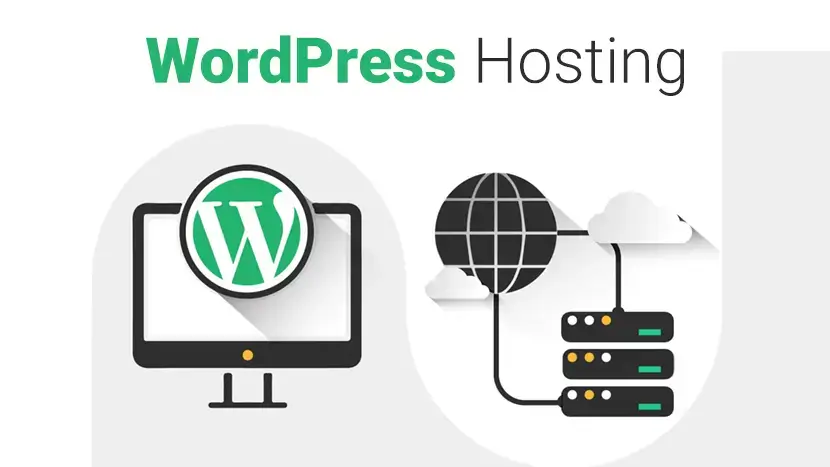
In this post, we’re going to tackle head-on the confusion that seems to keep coming up in the world of hosting with the terms WordPress hosting vs Web Hosting.
Using some form of web hosting is essential if you want to take your business online. Picking the right host can boost your site’s SEO, increase your sales, and provide tools and packages to help your business. But what is the difference between WordPress hosting and web hosting, and which is the better option?
WordPress hosting and web hosting are two very different types of hosting and are not to be confused. There are a few key differences between the two, and each has its own advantages, plans, and providers. Here’s a guide to WordPress hosting vs. web hosting and how to differentiate and choose between the two.
What is WordPress hosting?

In a nutshell, WordPress hosting is a form of web hosting optimized to run WordPress sites.
By using a WordPress host, you’ll receive lots of tools and services that are specifically tailored to WordPress sites. These may vary depending on what WP hosting service you opt for, but often include features such as one-click-install, automatic software updates, and a team of support staff who specialize in WordPress to provide you with customized support.
What is web hosting?
Web hosting is a much more general term and describes the process of an individual or organization buying a spot online to make their website accessible on the Internet.
A web host works by allocating space on a server to store the files associated with your website and by providing internet connectivity for your site. This allows your website to go live on the Internet and appear in search results.
Web hosting is very much an umbrella term, and there are lots of different types of web hosting, as well as different providers and features. If you plan on creating a website for your business, you’ll need to use some form of web hosting because you won’t be able to get your site online without a host.
What’s the difference between web hosting and WordPress hosting?
The key difference between web hosting and WordPress hosting is that web hosting is a much broader, overarching service, while WordPress hosting refers to a specific niche tailored to WordPress installs.
Web hosting is a more generalized service and refers to any hosting service that stores a site’s files on a server to make the site live on the Internet. A web host will cater to a wide range of site builders, and the websites stored on one of their servers may be operating on thousands of different platforms.
WordPress hosting, on the other hand, is a specific niche in web hosting. WordPress hosting can also use shared servers to host multiple websites at once but, unlike web hosting, every website on a shared server will be a WordPress site. A WordPress host caters specifically to WordPress installs and offers customized solutions, services, and support optimized for WordPress performance.
How to choose the best hosting option for your business
With over 338,561 web hosting service providers available worldwide, it can be difficult to choose the right one for your business – especially if you’re still deliberating between WordPress hosting vs. web hosting.
Both options have their advantages and are available from a wide range of providers in a variety of plans. To choose the best option for your business, keep in mind the key things a business needs in a web hosting service:
- Dedicated 24/7 customer service
- Supported domain name management
- Basic security features
- Uptime guarantee
- Server accessibility
WordPress Quick Overview
WordPress powers 35% of all websites on the Internet right now – and with a 4% annual growth, this is set to rise. WordPress is a hugely popular site builder and is used by businesses such as eBay, The New York Times, and Sony to create and power their websites.
According to research, WordPress is the most used CMS, and more than 1.1 million new domains are registered every six months. If you’re looking to create a business website or migrate your existing one, WordPress is a leading site builder – and it’s a noteworthy hosting option, too.
WordPress is an easy-to-use, simple, and fully customizable hosting option, and using a WordPress hosting service alongside your WP site will optimize your site’s performance and results.
WordPress hosting benefits
1. Improved Security : WordPress hosts offer servers equipped against WordPress-specific threats alongside a dedicated team who will stay on top of security issues and ensure your site is safe and secure.
2. Fast set-up and Performance : The website set-up process is made incredibly quick using pre-configured web technologies and the WordPress servers ensure fast loading times and quick uptime from the moment your site’s live.
3. Better Plugin Function : You won’t need to use as many plugins with a managed WP hosting service, because performance, security, and caching will all be optimized by the host. And for the plugins you do want or need, WP hosted sites are optimized to work with the most popular of them, which can be automatically updated.
4. Easy-to-add SSL Certificates : Most managed WordPress hosting plans allow you to add an SSL certificate to your site in a couple of clicks, at no extra charge.
5. Automatic Updates : Your website will receive automatic updates and upgrades, and security packages can be added to every website on a server at once.
6. Tailored Support : When using a WordPress hosting service, you’ll be able to access dedicated customer support services, experts in resolving WordPress issues.
Who should use WordPress hosting?
If you built your website using WordPress, you’ll benefit hugely from using WordPress hosting. WP hosting integrates perfectly with websites built with WordPress and will improve your site’s functioning, security, and offer automatic updates. You don’t have to use WordPress Hosting if you have a WordPress website, but combining the two creates the ultimate package.
Those looking for a managed hosting plan would benefit from WordPress hosting, too. WordPress hosts often offer managed services, where your site is run and maintained for you by WP experts. This is a great option for those with limited time or experience with running a website.
Web Hosting and WordPress Hosting Plans
Whether you choose to use WordPress hosting or web hosting, you’ll have to choose a hosting plan. Shared hosting, VPS hosting, Dedicated server hosting, and Cloud hosting are popular services offered by both WordPress hosts and web hosts.
WordPress hosts also offer some additional managed hosting services that can help with the running of your site.
Here are six of the most popular hosting plans available:
1. Shared Hosting : When you use a shared hosting plan, your website will share a server with other clients. This is a cheaper option and is easy to set up, making it ideal for those who are creating a starter website or who don’t have much site traffic.
2. Virtual Private Servers : A VPS plan is similar to shared hosting; you will share your server with other users, but you will be more isolated and have your own allotted space. This plan is ideal for those operating on a lower budget and who want a higher level of control and customization.
3. Dedicated Server : If you have a high-traffic website and need optimized performance and fast loading speeds, a dedicated server is a good choice. Dedicated servers offer you total customization, improved reliability, and the chance to scale your business up; but they are a high investment option.
4. Cloud Hosting : This is a relatively new type of hosting, where your website is hosted on a cloud infrastructure rather than stored on a physical server. This hosting plan has lots to offer to those looking for scalability and stability at a cheaper price, but pricing isn’t always fixed, so if your site experiences an increase in traffic, you might see an unexpected rise in costs.
5. Managed WordPress Hosting : Lots of WordPress hosting providers offer a managed service, where the host manages and runs all the technical aspects of your WordPress site for you. Managed Hosting plans can be run across any of the hosting plans listed above, and offer optimum security, performance, and configuration.
6. Optimized WordPress Hosting : If you’re looking for a hosting plan that offers pre-installed features and technologies to optimize your site, Optimized WordPress Hosting is a great choice. Optimized WordPress Hosting is a complete package plan and comes with pre-installed WordPress hosting, WordPress optimized servers, built-in WordPress security, and WordPress expert support.
Which plan you choose will depend on your budget, the amount of traffic your site receives, and how much help you want from your host in the running of your site.
List of WordPress Web Hosting Service Providers:
Read More : You can explore here 30+ Best Web Hosting Providers 2023
Video - Best Web Hosting For Small Business
Affordable Website Hosting for your domainIf you found this article helpful, we encourage you to share it on your social media platforms—because sharing is caring! For more information about article submissions on our website, feel free to reach out to us via email.
Send an emailWritten by RGB Web Tech
Latest Technology Trends
Latest technology trends shaping the future, including AI advancements, blockchain innovation, 5G connectivity, IoT integration, and sustainable tech solutions. Explore breakthroughs in quantum computing, cybersecurity, augmented reality, and edge computing. Stay ahead with insights into transformative technologies driving innovation across industries and revolutionizing how we live, work, and connect.
What is Dedicated Web Hosting?
Last updated on January 19, 2025 by RGB Web Tech
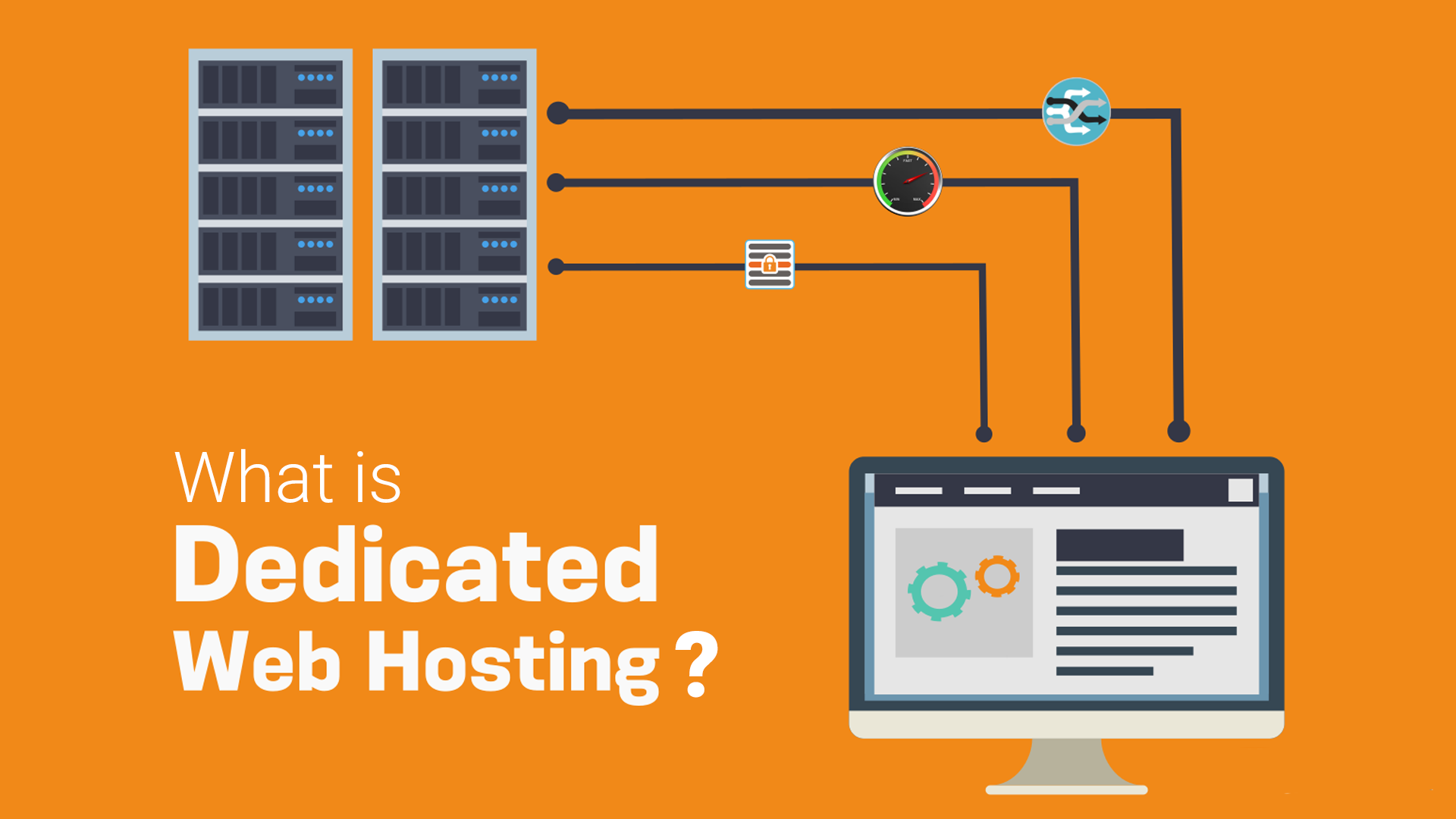
Dedicated hosting is a term used to describe web hosting packages that provide a dedicated server with dedicated resources to a single client. Dedicated hosting plans are ideal for WordPress websites with a very large number of visitors. Many WordPress hosting service providers offer Dedicated Hosting plans along with shared and VPS hosting plans.
For example, in a shared hosting plan, a client is sharing a computer with many other clients. In the case of a VPS hosting plan the clients are sharing a machine but not the resources with other clients on the same computer. However, on dedicated hosting plans a client leases a whole server with all of its resources. Web hosting companies offer different packages of dedicated hosting plans. Prices of these plans are based on the clients choice of hardware and resource allocation.
Dedicated hosting plans are ideal for large organizations or websites with much higher traffic. The clients get full control of the server which allows them to configure it to meet their own needs. The dedicated plans also come in managed and unmanaged forms where the hosting center can manage the server for the client in case of any problems. Dedicated Managed servers are generally more expensive. The pricing is also influenced by the amount of resources needed such as bandwidth, storage space, and amount of RAM, amongst other things. Additional expenses for dedicated servers also include the software packages needed to run the server. Such software can include licensing for Windows, if desired, cPanel, if desired, and other paid software. Free alternatives to most of the paid software packages are available but are not generally preferred due to issues with stability of the software. The main exception to the preference for paid vs free software is the widespread use of Linux over Microsoft or other paid OS on servers.
Advantages and Disadvantages of Dedicated Web Hosting
Whenever making decisions about web hosting, it can be helpful to make a list of advantages and disadvantages of a given option.
Advantages of Dedicated Web Hosting
- Full control of the server: Dedicated servers allow you to control everything about the device. This means you can choose any operating system, content management system, database type, and much more. You can also decide if and when to perform upgrades or other changes, which give you better control of uptime.
- Ability to customize your server: When signing up for a dedicated server, the hosting company typically lets you choose from several different server makes and models. This allows you to get the exact configuration you’re seeking. Some hosting companies even let you order a custom-built server that will be housed in their data center.
- Most powerful option: As you would expect when you can use all of the system resources of a server, your website or websites can handle huge amounts of traffic without a problem on a dedicated server.
Disadvantages of Dedicated Server Hosting
- Expensive: This is going to be the most expensive option available.
- You are responsible: Unless you also pay for management services, you’re responsible for things like updates and configuration settings. This means you need to have a good understanding of how web hosting hardware and software works to avoid any problems.
- Commitment: Some web hosting companies require you to commit to a set amount of time that you have the server. Since the hosting company has to buy the server up front, they often don’t allow you to cancel ― without a penalty ― right away.
Conclusion on what is a dedicated server
If your website is struggling to keep up with an increase in traffic, it may be time to migrate your website to a dedicated server. This is essentially a server that only hosts your site, and not only can it improve your site’s performance, but also enhance your page loading times and help you optimize security.
List of Dedicated Web Server Service Providers:
Read More : You can explore here 30+ Best Web Hosting Providers 2023
Video - Best Web Hosting For Small Business
Affordable Website Hosting for your domainIf you found this article helpful, we encourage you to share it on your social media platforms—because sharing is caring! For more information about article submissions on our website, feel free to reach out to us via email.
Send an emailWritten by RGB Web Tech
Latest Technology Trends
Latest technology trends shaping the future, including AI advancements, blockchain innovation, 5G connectivity, IoT integration, and sustainable tech solutions. Explore breakthroughs in quantum computing, cybersecurity, augmented reality, and edge computing. Stay ahead with insights into transformative technologies driving innovation across industries and revolutionizing how we live, work, and connect.
What is Cloud Web Hosting?
Last updated on January 19, 2025 by RGB Web Tech
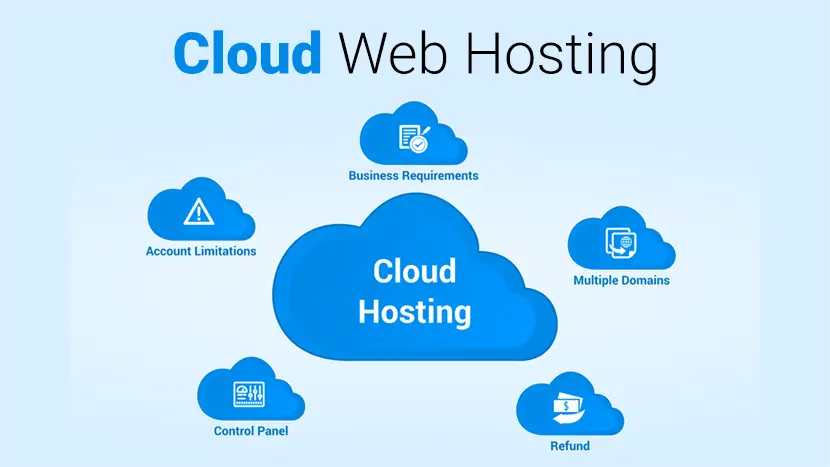
Cloud hosting is a type of web hosting which uses multiple different servers to balance the load and maximize uptime. Instead of using a single server, your website can tap into a “cluster” that uses resources from a centralized pool. This means that even if one server fails, another kicks in to keep everything running.
Visualize the cloud as a web of different computers which are all interconnected. As more machines are hooked up to the network, more resources are added to the overall cloud.
With cloud hosting, you get a part of the so-called cloud cluster. As opposed to traditional web hosting, where you get a certain amount of space from a single server.
Advantages of Cloud Hosting
There are many advantages of using cloud hosting over shared, VPS, or Dedicated hosting.
- Cost-Effective : One of the biggest reasons why businesses are switching to cloud hosting is because it is more cost-effective than the technology that runs on-premise. With traditional hosting, companies would have to spend money on disks or other storage devices and an IT team to look after these devices. But, with cloud hosting, you simply need to pay the vendor from which you are buying the resources. This saves resources, money, and time for the company. We can all agree on how important that is.
- Easy to Implement : When hosting on the cloud, businesses get to hold on to the same business processes and applications without dealing with the backend features. Since it is managed via the Internet, cloud infrastructure is easily accessible for companies.
- Scalability and Flexibility : A cloud server requires payment for only the used resources. A company does not always stay the same; it has the possibility to expand and shrink. Cloud hosting is also easily scalable which makes it easier for companies to add or remove resources according to their needs. The system grows with the company without extra burden on the company.
- Backup and Disaster Recovery : With every company, there is a risk of data and even financial loss. It is necessary that a company have a disaster recovery program. With cloud hosting, disaster recovery is rarely needed since data backups are automatic. This redundancy in data storage makes the possibility of losing data highly unlikely.
- Accessibility : With the Internet, it is so much easier to access data that is stored on web-based applications from anywhere. Having information that is stored in the cloud makes it much easier for that data to be accessed from anywhere and at any time regardless of the machine. This easy accessibility is one of the biggest advantages of cloud hosting.
Disadvantages of Cloud Hosting
Bandwidth Issue : Cloud hosting depends fully on the Internet. This means that a company needs to always have the Internet that it can rely on and is consistent. The Internet also has to have a fast connection and good bandwidth for the company to be able to take full benefit of the service. If you live in an area that does not have access to a good Internet connection, cloud hosting might turn out to be less fruitful for you.
Limited Control : The servers that host the cloud services are managed by the service providers. The providers are also the ones who own these servers. This makes it difficult for companies using these services to have the type of control that they want over their infrastructure.
Privacy: One of the biggest issues of Cloud hosting could be security issues that can arise if a person without some kind of technical knowledge is trying to use the service. You need technical assistance to benefit from the service. Another reason for security issues could arise from using a service that requires companies to share resources.
Vulnerable to Attacks: The biggest problem when using a web-based application or any kind of web-based service is that the Internet is filled with people who are looking to profit off of someone else’s loss. It is not unusual for a web-based service to get hacked or have a data breach.
When using a cloud hosting service, it is important to note that there are several other companies using the same service from the same vendor as you. This can result in information theft either via hackers or via a company that is in competition with your company. Even though security measures are applied in the cloud, the risk of attacks is something to consider before using this type of service.
Downtime : One of the biggest potential downsides to using a Cloud hosting service is downtime. The service providers, the vendors, can also face technical difficulties on their side. This could be power loss or faulty internet connections, maintenance of data centers causing them to go out of service for some time.
Conclusion : Just like with everything else, cloud hosting might not be the best option for every business. With the growing use of the Internet for almost everything, it is probably best to stay up to date with current technologies so that you are not left behind on progress. It is important to note that the advantages outweigh the disadvantages of cloud hosting but it might not be a necessity for everyone.
List of Cloud Based Web Hosting Service Providers:
Read More : You can explore here 30+ Best Web Hosting Providers 2023
Video - Best Web Hosting For Small Business
Affordable Website Hosting for your domainIf you found this article helpful, we encourage you to share it on your social media platforms—because sharing is caring! For more information about article submissions on our website, feel free to reach out to us via email.
Send an emailWritten by RGB Web Tech
Latest Technology Trends
Latest technology trends shaping the future, including AI advancements, blockchain innovation, 5G connectivity, IoT integration, and sustainable tech solutions. Explore breakthroughs in quantum computing, cybersecurity, augmented reality, and edge computing. Stay ahead with insights into transformative technologies driving innovation across industries and revolutionizing how we live, work, and connect.
What is Reseller Hosting? And How Does It Work?
Last updated on January 19, 2025 by RGB Web Tech

Reseller web hosting is an option that involves one company (a hosting provider) renting hard drive space and bandwidth to another company (small-midsize business), who then rents the space to third parties (entrepreneurs-small business). Simply put, reseller hosting is the ability to provide hosting to your own clients as if you yourself were the web hosting company.
This is typical for aspiring entrepreneurs who want to start their own web hosting firm or for current web developers and designers who desire to add additional services to their brand.
Advantages of Reseller Hosting
1. Cost : Plans for reseller hosting are fairly cheap. This is why they’re a good option for people looking to get into the web hosting business. Additionally, it simplifies things because you don’t have to purchase the technology, infrastructure, and equipment usually needed to become a web hosting service provider.
2. Focus on the Business : When you choose reseller hosting you can focus on the business aspects rather than the technical aspects of running a web hosting business. This is because all of the tasks related to updates, server maintenance, connectivity, security and so forth, are the responsibility of the web hosting service you’ve rented or purchased from.
3. Room to Expand : If you have a website that gets a lot of traffic, has a lot of pages or your business has several sites, reseller hosting will provide you with a larger number of features and space. For instance, you can run different parts of your sites from different URLs and different servers without having to purchase additional hosting plans.
4. Additional Features : In comparison to basic hosting plans, reseller hosting has a greater number of features. The control panel for the website will also be more powerful, enabling you to manage your site more effectively. Furthermore, a lot of companies will offer unlimited SSL certificates as well as features such as Cpanel.
5. Build Your Brand : Although you’re selling the resources of another web hosting service provider, reseller hosting lets you build your own identity and brand. Essentially, this means that clients won’t know that you’re renting from another web hosting company.
6. Income Opportunities : It’s possible to make additional profit from reseller hosting by selling add-ons such as SSL Certificates, Dedicated Hosting, VPS Hosting, Dedicated IP, domain name registrations, etc.
Disadvantages of Reseller Hosting
1. You’re Dependent on the Original Web Hosting Company : The quality of the original web hosting company will determine the success of your business. This means that if their server regularly goes down or if there are a lot of technical issues, your business will be affected.
2. You’ll Need to Dedicate Time to Customer Service : If you’re providing a web hosting service, even if it's reseller hosting, you’re still responsible for answering questions from clients. If you don’t take the time to answer these questions correctly, it could ruin your business.
3. High Level of Difficulty : Unless you’re an expert at running a website you’re going to find the features and control panels of reseller hosting difficult.
4. Changing Providers will Affect Your Clients : If you decide to change your web hosting provider you have to shift all the data from your clients. This can be incredibly difficult so it’s recommended that you have a dedicated server or Virtual Private Server (VPS). Having a dedicated server or VPS will make it easier to change providers but it does make things more expensive.
5. Limited Access to the Server : You are going to have to go through your web hosting service provider for most things because reseller hosting only offers limited access to the server.
How Do You Make Money as a Reseller?
Nobody is going to pretend you’re going to get rich with reseller hosting but you can make extra income from it. You also gain an income from those clients attracted by the complete packages a web designer can offer that includes site setup and hosting in one.
Essentially, if you offer full managed hosting to your customers, you can charge a premium as compared to standard hosting, where you would charge let’s say $50/month to each client, but handle all their technical needs and maintenance, such as upgrades of core CMS, plugins, backups, security, etc.
Your residential income depends on the wholesale price you pay to the host and the maximum your market can sustain. As mentioned, some hosts charge a monthly maintenance fee for reseller hosting accounts but many don’t. It pays to research the market, what’s on offer and at what price before you settle on one provider.
Most reseller accounts are scalable so you can start small when you first launch your offering and scale up only when you need to. This is a cost-effective way to do business and keeps your costs down as much as possible.
How to Choose the Best Reseller Hosting?
If you have your business plan in order then the main task left to you is to choose the best reseller hosting for your needs. When you’re considering a web hosting service that has reseller plans make sure to check for the following:
- Does the reseller have a solid reputation for reseller hosting?
- Does the hosting service have a plan that meets your budget and hosting needs?
- Do they have a good software interface to manage your reseller account?
- If you’re not satisfied, do they have a money-back guarantee?
- Do you have access to technical support? What kinds of support services? Phone/email/chat?
- If your business grows and requires an upgrade, will they provide an upgrade path for your hosting service?
Choosing a service is often a matter of personal preference and perspective, but this checklist should help lead you to a reseller host that will provide the solution you need.
FAQs - Reseller Hosting
1. What is reseller hosting?
Answer :Reseller web hosting is an option that involves one company (a hosting provider) renting hard drive space and bandwidth to another company (small-midsize business), who then rents the space to third parties (entrepreneurs-small business). Simply put, reseller hosting is the ability to provide hosting to your own clients as if you yourself were the web hosting company. This is typical for aspiring entrepreneurs who want to start their own web hosting firm or for current web developers and designers who desire to add additional services to their brand.
2. How does reseller hosting work?
Answer : Here are the (perhaps over-simplified) steps to establishing a reseller business: 1. Research and select a hosting company. 2. Purchase the reseller package that meets the goals of your business. 3. Know and understand your target market to locate your new customers. 4. Create your own branded hosting packages. 5. Decide your price. 6. Sell hosting packages to your clients. 7. Earn profit
3. What’s included in a reseller package?
Answer : Below are some of the common features often included in Reseller packages: 1. Disc Space 2. Bandwidth 3. Domain Hosting 4. Ability to brand your own web hosting company with the hosting provider company unknown to your client (also known as “white label”) 5. Latest cPanel control panel. 6. Manage your own plans and configure different accounts based on your needs. 7. Pass on features to your own clients such as email, control panel, additional scripts and monitoring tools. 8. Premium support (usually 24/7) offered by hosting providers.
4. Will my clients know it’s me…or my hosting company?
Answer : They will believe it’s you! You see, you can run your own hosting business under your banner and brand without your clients knowing who your actual upstream hosting provider is. This gives you total control in promoting your business with your name written all over it!
5. Do I need to be a hosting expert to succeed at this?
Answer : Nope. Your provider will handle all the backend, “dirty” work, so you can focus on building your business. Server hardware, connectivity, network infrastructure, hardware setup and maintenance, security and updates for your servers are all addressed by your web hosting provider. It’s a good idea to check into these things as you do your research to ensure that you’ll receive the best tech support if certain issues arise…and they likely will.
6. If my business grows, can I upgrade at any time?
Answer : Absolutely…you can upgrade your reseller hosting account at any moment to expand with the demands of your business.
7. How do I get started?
Answer : To get started, you simply follow the steps outlined in FAQ-2. The foundation to your success will lie in choosing a good reseller web hosting provider that not only meets the objectives of your business, but can provide you with consistent, reliable service and support because it's your name that is on the line when dealing with your customers. Choose wisely…which leads to the final FAQ…
8. How do I choose the best hosting provider?
Answer : It’s important to know that you can offer your own customers the best possible web hosting experience prior to building your clientele. Here are just some qualities to keep in mind when searching for your reseller web hosting service: 1. Easy to use cPanel 2. At least 1 site builder 3. Satisfaction guarantee 4. Private nameservers 5. Brandable client panel 6. 24/7/365 impeccable support 7. A 99.999% uptime guarantee 8. Fully managed services
Conclusion
In sum, reseller hosting can be lucrative if you’re looking to get into the web hosting business or if you’re a developer or designer. However, it is a lot of work and is certainly not for everyone. Make sure you research web hosting service providers to ensure they can offer your site optimal performance and make sure you’re comfortable with advanced website controls.
List of Reseller Web Hosting Service Providers:
Read More : You can explore here 30+ Best Web Hosting Providers 2023
Video - Best Web Hosting For Small Business
Affordable Website Hosting for your domainIf you found this article helpful, we encourage you to share it on your social media platforms—because sharing is caring! For more information about article submissions on our website, feel free to reach out to us via email.
Send an emailWritten by RGB Web Tech
Latest Technology Trends
Latest technology trends shaping the future, including AI advancements, blockchain innovation, 5G connectivity, IoT integration, and sustainable tech solutions. Explore breakthroughs in quantum computing, cybersecurity, augmented reality, and edge computing. Stay ahead with insights into transformative technologies driving innovation across industries and revolutionizing how we live, work, and connect.
What is Managed Web Hosting?
Last updated on January 19, 2025 by RGB Web Tech

Managed dedicated hosting is an IT service model where a customer leases dedicated hardware from a managed hosting services provider. This solution includes servers, storage, and networking hardware. Because you aren’t sharing these resources with anyone else, it’s referred to as a single-tenant solution.
When you choose managed dedicated hosting, you get to choose your operating system while your service provider handles the administration, management, and support of your solution. And because you’re not sharing any of these resources with another tenant, you have access to the full performance capabilities of the hardware you’re leasing.
Managed Web Hosting Pros & cons
Pros:
- Time-saving (managing and maintenance is taken care of so you can focus on your core business).
- Cost-saving (no expensive upgrading hardware, no IT staff to run and maintain the server needed, no own servers, therefore no risks of damages).
- Reduced risk (technical support of highly specialized technicians always available).
- Reliable (managed hosting service level agreement guarantee that your site is continuously available and monitors all important operations).
- Flexible and fast solutions (e.g., scalability).
- Technology is always up-to-date (a professionally managed hosting company provides you access to the latest technology).
Cons:
- No own server storage and network.
- Control is given away to the hosting provider; therefore, a highly professional and reliable company has to be chosen.
Unmanaged Web Hosting Pros & cons
Pros:
- Own servers.
- Fully and autonomous control over processes and operations
Cons:
- Time-consuming (you have to manage and maintain your networks, storage, servers, updates, etc.).
- Can be costly (specialized IT staff for running and maintaining the server has to be employed, defect hardware has to be renewed).
- Support depends on the working of team members.
- Scalability is not given or complicated.
- Usage of the latest technology depends on the budget.
Summed up, the benefits of managed web hosting are quite obvious.*
Conclusion
Managed hosting services are recommended for your e-commerce shop. While unmanaged hosting was a popular solution in the past, day to day, managed hosting services are providing individual solutions easily and comfortably.
By outsourcing your hosting to a reliable hosting provider, you are making the right choice.
Managed hosting ensures you get the latest technology combined with the professional support of highly specialized experts.
Having such a powerful hosting solution working for you in the background enables you to concentrate on your main business like never before.
List of Managed Hosting Service Providers:
Read More : You can explore here 30+ Best Web Hosting Providers 2023
Video - Best Web Hosting For Small Business
Affordable Website Hosting for your domainIf you found this article helpful, we encourage you to share it on your social media platforms—because sharing is caring! For more information about article submissions on our website, feel free to reach out to us via email.
Send an emailWritten by RGB Web Tech
Latest Technology Trends
Latest technology trends shaping the future, including AI advancements, blockchain innovation, 5G connectivity, IoT integration, and sustainable tech solutions. Explore breakthroughs in quantum computing, cybersecurity, augmented reality, and edge computing. Stay ahead with insights into transformative technologies driving innovation across industries and revolutionizing how we live, work, and connect.
What is Colocation Hosting?
Last updated on January 19, 2025 by RGB Web Tech

Colocation hosting is a type of service a data center offers, in which it leases space and provides housing for servers. The clients own the servers and claim full authority over the hardware and software. However, the storage facility is responsible for maintaining a secure server environment.
Colocation services are not the same as cloud services. Colocation clients own hardware and lease space, with cloud services they do not have their hardware but lease it from the provider.
Colocation hosting should not be confused with managed (dedicated) services, as the second implies the data center also assumes management and maintenance control over the servers. With colocation hosting, the clients are the one who is responsible for supplying, maintaining, and managing their servers.
Pros of Colocation hosting
- Greater amount of bandwidth at considerably lower cost.
- Colocation hosting is flexible, efficient and secure than hosting your own server.
- Better outage protection- it might be difficult to tackle data center downtimes at your enterprise during long duration power loss. But a colocation provider will facilitate power generators and backup power to deal with such situations.
- Using and upgrading – You own the server machinery and are free to upgrade it anytime you wish, and use or install any software tools without relying on the provider. Perfect room temperatures for your servers.
- Use your service provider for additional services if you are short-staffed in your IT team, or during major upgrades or activities
Cons of Colocation hosting
- Colocation hosting needs a higher start-up cost than if renting servers from hosting companies.
- Finding the right colocation provider in terms of proximity, pricing, and services.
- Have to purchase equipment and updates on your own.
- Budgeting becomes confusing with fluctuating monthly rents due to bandwidth.
- Restrictions on maintenance with regards to time or resources.
Conclusion
Colocation hosting provides numerous benefits to the clients to expand and gain a competitive edge over their competitors. However, it has some drawbacks too. Therefore, careful analysis is required before opting for a colocation facility. We hope that now you are aware of every aspect of What is colocation web hosting, including the pros and cons.
List of Colocation Hosting Service Providers:
Read More : You can explore here 30+ Best Web Hosting Providers 2023
Video - Best Web Hosting For Small Business
Affordable Website Hosting for your domainIf you found this article helpful, we encourage you to share it on your social media platforms—because sharing is caring! For more information about article submissions on our website, feel free to reach out to us via email.
Send an emailWritten by RGB Web Tech
Latest Technology Trends
Latest technology trends shaping the future, including AI advancements, blockchain innovation, 5G connectivity, IoT integration, and sustainable tech solutions. Explore breakthroughs in quantum computing, cybersecurity, augmented reality, and edge computing. Stay ahead with insights into transformative technologies driving innovation across industries and revolutionizing how we live, work, and connect.
Best Domain Name Provider
Last updated on January 19, 2025 by RGB Web Tech

Choosing a domain name is an important decision for any website owner. If you’re wondering what domain names mean, you’re not alone. The following information will shed some light on the subject matter.
Definition of Domain Name
A domain name is used to recognize one or more IP addresses. Domain names are used in URLs to recognize Web pages. For instance, in the URL https://www.rgbwebtech.com, the domain name is rgbwebtech.com.
Since the Web is supported by IP addresses, every Web server must have a Domain Name System or DNS server. A DNS server translates domain names into IP addresses.
Each domain name that exists has a suffix that displays which ‘top level domain’ it belongs to. What is a domain name suffix? Here are a few examples:
- .com – Commercial business
- .gov – Government agencies
- .org – Non-profit organizations
- .net – Network organizations
- .mil – Military agencies
- .edu – Education facilities
- .ca – Canada
- .uk – Europe
- .th – Thailand
Best Domain Name Providers
If you want to explore more domain name plans, here is some domain name services provider companies as below:
Read More : You can explore here 30+ Best Web Hosting and Domain name Providers 2023
Registering a Domain Name
It is a simple process to register your domain name. Simply choose a web hosting site, choose your domain name, and pay the registration fee. However, it is not as simple if the domain name you have chosen is already taken. All reputable domain registration websites use WHOIS to determine eligible domain names. WHOIS can also show you the owner of the domain name you have chosen which is not available.
Choose a domain registration website which offers more than purchasing your domain name. Do your research on prices and services offered. You will need services to host your website as well. Otherwise, no one will find your domain. You will also benefit if you choose a domain registration website which offers services such as fixing your domain and how to help your website gain traffic.
Your web hosting plan does not necessarily have to be purchased through the same site as the domain registration. However, the convenience of having all your services under one roof is beneficial and cost-effective for most e-commerce website owners.
Choosing a Domain Name
Choosing a domain name is not always the easiest part of creating a successful website. You need a domain name that is creative, brand worthy, and easy to remember. However, the one you choose for your business might not be available. While this can be frustrating, there are ways to make it easier.
Domain Name Generators
Using a reputable domain name generator reduces the amount of time you spend trying to find an available domain name. Domain name generators use an algorithm to filter through thousands and thousands of available names and suffixes.
When your chosen domain name is not available, you can use suggestions that will add prefixes or suffixes, abbreviations or other variations of that domain name. Most domain name generators provide available suggestions.
Tips for Choosing a Domain Name
The following tips will help you in narrowing down your options.
1. Brandable: While a generic domain name is convenient and easier than sifting through thousands of options, a creative domain name is brandable. Customers will remember it when they think of your products and services building your brand in the process.
2. Get Creative: Google, Yahoo, and Pepsi are all made up words, which through marketing strategies has worked well for their companies. Use a thesaurus when you have trouble coming up with words that mean the same as your keywords. A catchy domain name that is easy to say and spell will stick with targeted customers.
3. Short and Easy to Type: Use words customers can easily spell. Do not use the slang version as it will cause misspelled domain names, lead to the wrong IP address, and loss of customers to the competition.
4. Use keywords :Keywords in your domain name that describe your business make it easy for customers to remember. Search engines also like keywords in the domain name.
5. Do not use hyphens or numbers : Often numerical numbers get written out, and hyphens are misplaced or not used at all. If another domain name is similar to yours, you will lose this customer to the competition.
6. Use .com : You may have noticed there are multiple top-level domain (TLD) extensions available to use. However, using .com, which is the most recognized and thought of TLD, will ensure customers get to your website.
7. Protect Your Domain Name : It is a good marketing strategy to buy as many variations of your domain name as possible. All variations are then forwarded to your top-level domain name which you will use for your website and all marketing purposes. Typo squatters trying to steal customers will use variations of your domain to trick customers into thinking their website is yours, the one they were looking for.
8. Long-term thinking : The top-level domain name you choose is tied to your brand and your business for life, like a marriage. If you decide to change it in the future, you are going to be starting from scratch again. It will cost you in branding, SEO marketing, and possibly the loss of customers.
Also, in long-term thinking, consider the niche you have chosen. Are you comfortable staying within that niche, or do you have dreams of expanding to different niches? This is a business-making decision that needs to be made in the beginning. You will have a hard time expanding to different niches with the same domain name and could lose the chance of loyal customers following you on your business adventures.
1. Now What : What do you do after choosing your domain name? What if you are not ready to use it yet? No worries, you will not lose the domain name you have finally chosen to purchase.
2. Park it : If you are not ready to create a website or use the new domain name for your new email address, you will not lose the domain name. Your domain registration provider or web hosting service has options for you to park it until you are ready.
3. Use it for email : Having your new domain name means you can now send and receive emails using it. It will be personalized, unique and more professional than a Yahoo, Hotmail, or another temporary account. Get a webmail, e-mail package or buy a web hosting package which usually includes e-mail for your new domain.
4. Create a new website : Build it yourself or use a professional web design service. Tell the world what you have to offer or what is important to you.
5. Sell It : Domain names can make great investments. Build a single ‘For Sale’ page and point your domain at that. Many such websites have been created just for brokering domain names.
What are the benefits of a domain name?
There are so many websites in the world already, does having a custom domain name still make a difference? On a basic level, domain names affect how easily your potential customers can find you on search engines, and what a visitor’s first impression of your service will be. The short answer, then, is yes: domain names are important.
What are the tangible benefits to having a domain name?
Domain names can benefit your business by helping you to:
- Reach your target market
- Maintain brand ownership
- Be memorable (get found easily by customers)
- Build an online presence
- Set expectations
- Develop credibility
- Boost your SEO
- Compete with other businesses
- Grow and expand
Benefits of Domain Names: For the Business
1. Connect with your market : A bespoke, high quality domain name enables you to speak directly to your specific corner of the market by setting more precise expectations regarding what your business has to offer. This saves you – and your customers – time and enables you to connect with them clearly and quickly.
2. Control your brand : If you don’t secure your preferred business domain name, you run the risk of somebody else purchasing it and losing control of your brand. Even if you’re not sure you’ll want to use it, buying a domain name for your business benefits you by ensuring that no one else can secure your name and potentially siphon you customers (or even maliciously damage your reputation). For example, if you’re the proprietor of Holly’s Handbags, you’ll want to have a domain as similar to Hollyshandbags.com as possible.
3. Be remembered and get found online : A domain name helps you stand out and be memorable. Having a site with a ‘.blog’ before your name doesn’t exactly help customers find you in a quick search and makes it hard to remember your business’s URL. Buying a domain name can help you solve this problem and ensure your clients remember you and can find you whenever they need.
4. Online presence, Identity and branding : Your site’s name allows you to communicate something to your visitor about what your services are and what your core message is. Used correctly, a name can contribute to your overall reputation and branding – and we all know that a good reputation means more customers and sales. A good domain name basically helps you set up a vision for your business’s identity, and secure better online visibility.
5. Add a layer of credibility and professionalism to your business : Having a personal domain name is a good sign that your company is trustworthy, and should be taken seriously.
6. Increase your site’s SEO : This is all about how your website appears to (and on) search engines. Having a relevant domain name that directly links to your service or product and the words people commonly use to search for these is sure to impact on your website’s ranking.
Of course, there are a myriad of factors that can affect how a site ranks on search engines like Google. That said, a good domain name can definitely bolster your site’s ranking on search engines and help drive more traffic to it.
7. Develop a competitive edge : A personal domain name puts you on a more even playing field in comparison to big companies, helping you compete alongside every one of your competitors – even if they’re much bigger.
To put it bluntly, every well-known business has an independent domain name these days. As such, a unique domain name is just part of the process of starting a business in 2023. It can form a big part of your growth, and might even be the first step to your business’s long success.
Benefits of Domain Names: For the Consumer
1. You may be wondering: what are the benefits of an independent domain name from the consumer’s perspective? When it comes to the consumer, the advantages of having a domain name largely boil down to expectations and finding the relevant services quickly.
2. They know what to expect : For a potential customer, an accurate domain name is how it helps you to understand the kind of business you’re dealing with and what to expect from it. For instance, if you spotted a website called ‘onlyorchids.com’, but you were actually looking to buy a bouquet of roses for your mother, you’d immediately know from the domain name that the flowers on offer from this business weren’t for you.
3. Save time : Domain names help weed out irrelevant results on a search engine, helping potential customers find the exact services they’re looking for more quickly and cutting down on unnecessary searching time. The end result? Consumers are able to get a better sense of all the relevant businesses offering a particular service through a quick search.
All in all, the benefits of domain names for your consumers can’t be overlooked. Whilst your site’s name only represents one part of creating a business, domain names do play a role in helping consumers connect to the services they’re looking for quickly and with ease. They set expectations, helping consumers identify exactly what a business is offering and whether it is for them.
FAQs - Registering a Domain Name
1. What is a domain name?
Answer : A domain name enables your customers to access your website through the world wide web.
2. Why do I need a domain name?
Answer : A domain name serves as a distinct identity on the word wide web. If you would like to promote yourself, take your business online, etc. a domain name is a must.
3. Is there a character limit for a domain name?
Answer : Yes, the minimum character limit for a domain name is one and maximum 63 characters.
4. How do I protect the contact information associated with my domain name?
Answer : Domain Privacy Protection hides the domain registrant's personal information from the public WHOIS database.
5. Is Privacy Protection worth it?
Answer : The contact information for all domain owners is available in the WHOIS directory. You can protect your personal information by opting for Domain Privacy Protection. We hide your information from public view.
6. Besides a domain name, what else do I need to have a website?
Answer : Apart from purchasing a domain name, you need to develop your website, blog. There are several options to host your website. For eg., Content Management System (a.k.a. CMS) such as WordPress, Magento, Drupal, Joomla or hire a developer to code your website. You can also have a look at the various web hosting plans.
7. How do I restore a deleted domain from the redemption grace period?
Answer : If a domain name is not renewed within the Renewal Grace Period, it would be queued for deletion at the end of the Renewal Grace Period and subsequently Deleted.
8. What are some tips when choosing a name?
Answer : Search for a domain name that's easy for people to remember and spell. This approach can help establish your brand and credibility. Unless your brand name is already well established, purposeful misspellings will just confuse potential clients and website visitors.
9. How do I choose a domain that stands out?
Answer : Every domain is unique, just like every physical address or telephone number. But you want a domain that really sets you apart and reflects your brand, style or personality – the type of domain name that clients will be sure to remember.
10. What if I need help choosing the right domain?
Answer : If you're still feeling stumped in your domain name search, you can reach out to our amazing support team, who are always on standby to talk to you and help you with your domain name registration.
Conclusion
These were the top domain name registrants in India. The aim of this blog was to give you an idea regarding where to purchase domain names. While purchasing, always remember that the right domain name brings in more credibility and traffic to your business. To conclude, a domain name builds your brand hence do not delay purchasing a domain and always use the right site to make the purchase.
We can now conclude that the overall best Domain Registrars are Bluehost, Hostinger, ScalaHosting etc.
Video - Best Web Hosting and Domain Name Provider
Affordable Website Hosting for your domainIf you found this article helpful, we encourage you to share it on your social media platforms—because sharing is caring! For more information about article submissions on our website, feel free to reach out to us via email.
Send an emailWritten by RGB Web Tech
Latest Technology Trends
Latest technology trends shaping the future, including AI advancements, blockchain innovation, 5G connectivity, IoT integration, and sustainable tech solutions. Explore breakthroughs in quantum computing, cybersecurity, augmented reality, and edge computing. Stay ahead with insights into transformative technologies driving innovation across industries and revolutionizing how we live, work, and connect.
17 Best FREE Web Hosting Services
Last updated on January 19, 2025 by RGB Web Tech

Is free website hosting any good? Well, “free” is always good but not always worth it in the long run. Let me explain:
In short, if you want to run a test website, you’re not expecting to get much from it, and you don’t want to invest any money into it at all, then free website hosting might indeed work for you!
In 95% of other cases, you’re going to be better off with a cheap website hosting plan like Bluehot, Hostinger etc. no more expensive than $2.75 or even $1.99 per month (small businesses or online stores often choose something in this price range).
If you’re in a hurry, here’s a summary of our findings based on the analysis below:
Free website hosting is okay for a hobby project or a proof-of-concept type of project. It’s okay if you want to run a site for a short while, get your data and then shut it off.
For any sort of serious website building project or a site that’s meant to stay online for a long while, you’re better off with an affordable web hosting plan or even a pick from the very best web hosting services out there.
For example, Bluehost is our recommended self-hosted website server. If you check them out through our link, you’ll unlock a special discounted price of $2.75 / mo vs the $3.75 standard entry-level price. You also get a free domain name bundled in.
Alternatively, you might opt for an all-in-one solution. For example, Wix is a good choice for a quick start, covering both hosting and website builder in one place. Although there is a free plan, you can try any premium plan offering 14 days of money-back.
Want to get the full story? We compared 17 best free website hosting options to help you make your decision.
The limitations of free website hosting
In life, you tend to get what you pay for, and web hosting is no exception. If you choose the free hosting route, be prepared for some common issues that come along with it.
Even the best free hosting tends to be fairly unstable, which can result in downtime. Also, providers typically place restrictions on storage space and bandwidth, limiting your site’s growth and traffic capacity. Your personal website or business website may also have slow performance.
That said, there are times you may want to consider free hosting. For a personal project, it may be all you need. The same is true if you’re practicing your web design and web development skills and just want a space to try out new ideas.
Perhaps you’re setting up an area to test new plugins or themes. In that case, the limitations of free hosting shouldn’t be a barrier to what you want to accomplish. Of course, if you simply need a staging site, you may want to use a local development tool, such as Local, and not worry about hosting at all.
However, if you need a live site and don’t want to deal with the drawbacks of free web hosting, there are some affordable alternatives to consider. A cheap host can help you keep your budget low while avoiding poor site availability.
17 Best FREE Website Hosting Services
The good news is that you can test drive free website hosting at no cost to see if it might work for you. If you’ve decided to give it a try, here are 17 options to consider.
1. InfinityFree
InfinityFree is a free web hosting service that boasts a 99.9% uptime guarantee. It offers users:
- An auto-installer with more than 400 different apps, including WordPress
- Free subdomains
- 5 GB disk space
- Unlimited bandwidth
- 400 MySQL databases
- Knowledge base support
You’ll also have access to the Softaculous Script Installer to set up WordPress. This hosting service provider doesn’t offer domain registration, but you can use one you’ve acquired from another registrar.
Once your website is published, your visitors won’t see ads. However, there will be ads in cPanel on the back end. Your site is also limited to 50,000 hits per day.
2. Wix
Wix is a drag-and-drop website builder – similar to tools like Weebly or Squarespace; and yup, you don’t need to be familiar with PHP, like you do with other solutions (e.g. – Joomla).
However, we’re featuring Wix on this list because it’s kind of an all-in-one solution for both a website platform and server space to host that website. Since Wix does come with a free plan, this makes it a free website hosting service as well. This free website builder is a unique way to enjoy awesome site-building features backed by enterprise-grade reliability. On that free plan, you get:
- Wix.com subdomain
- Beautiful templates
- 500 MB disk space
- 500 MB bandwidth
- Global content delivery network
- Free SSL and security monitoring
- Knowledge base and customer support
- Decent load times
Unfortunately, if you’re expecting no ads, you will be disappointed. Just like most of the free web hosting providers, Wix places their own ads on free plan sites. You can only connect a Wix subdomain and would have to move to a paid plan for connecting a custom domain.
The eCommerce functionality is also unavailable in the free version. However, you can still set up things like bookings, events, and forums, and fill in your site with SEO-friendly content with just a few clicks.
3. ByetHost
ByetHost is another free hosting service that you could use. Its plan features:
- Five subdomains
- 1 GB disk space
- 50 GB monthly transfers
- One MySQL database
- 24/7 support via ticket system and knowledge base
ByetHost offers solid support for its free plan, which can be rare. You can access a self-service knowledge base and video tutorials, but a ticketing system is also available.
In addition, you’ll receive usage statistics such as disk space, bandwidth usage, and daily hits. You can find this data in VistaPanel, which is ByetHost’s free hosting control panel. Then, you can use the information to help budget your resources.
4. 000WebHost
000WebHost is a free hosting option from Hostinger. Some of its features include:
- One website
- 300 MB disk space
- 3 GB of bandwidth
- One MySQL database
- Community forum
000WebHost comes with the Zyro website builder, which should make designing your site less intimidating. Like InfinityFree, visitors to your website won’t see ads, but there will be ads in your WordPress dashboard.
Free hosting from 000WebHost doesn’t even require a credit card to set up, and you can use it as long as you like. Also, if you outgrow your free plan, you can easily upgrade to a cheap plan from Hostinger. Hostinger plans start at $1.99 / month for your first billing cycle.
5. Google Cloud Hosting
Google Cloud Hosting isn’t technically free. However, it does offer a one-year free trial that includes:
- One website
- Unlimited storage
- Extensive support documentation
While Google Cloud Hosting is tailored towards large businesses, anyone can use it. To get started, all you need is a Google account.
The free trial lasts for 12 months, or until you’ve used up the $300 credit it includes. After this, you only pay for the resources you use. Google offers a price calculator to help you estimate your costs.
6. AwardSpace
AwardSpace offers a variety of hosting services. It’s best known for its free plan, which includes:
- One website
- Three subdomains
- 1 GB disk space
- 5 GB bandwidth
- MySQL database
- 24/7 live chat
Awardspace includes one-click content management system (CMS) installation as well as the Zacky website builder. Also, the 24/7 live chat is available to free plan users if you have questions.
Once launched, your own website will be ad-free. Plus, you can place ads to monetize it. AwardSpace provides you with the ability to monitor your bandwidth usage as well, which may help you budget your resources.
7. Freehostia
Freehostia offers paid and free hosting. The free plan, called ‘Chocolate’, provides:
- Five websites
- 250 MB disk space
- 6 GB bandwidth
- One MySQL database
- FAQ and ticket support system
Freehostia’s cluster platform aims to offer more reliability from its free hosting. Hopefully, this results in less downtime for your website.
You’ll have access to a website builder complete with templates. If you run into issues, you can have an answer to your support ticket in one hour, even with the free plan.
8. FreeWebHostingArea
FreeWebHostingArea is a volunteer-maintained free hosting service. It offers:
- 1.5 GB disk space
- Unmetered traffic
- MySQL databases
- Free email support
9. W3Schools Spaces
W3Schools Spaces features of the free plan:
- Free templates
- Allow 500 requests/month
- Allow 100MB data and storage/month
- Free SSL
10. Glitch
Glitch features of the free plan:
- Provide 4000 requests/hour
- The server processes 512MN of RAM
- Storage capacity 512MB
- Unlimited static sites
- Support import/export Github function.
11. Fleek
Fleek features of the free plan:
- Support to edit domains
- Provide services https
- 3GB of storage
- Unlimited websites
- Automatically deploy on Git
- 250 minutes to build and 50GB of bandwidth
- Free SSL
12. Netlify
Netlify features of the free plan:
- Automatically built from Git
- Deployed on the global edge network
- Bandwidth: 100GB/Month
- Number of websites: Unlimited
- Restorable to any version
- Provides a free CLI.
13. Render
Render features of the free plan:
- 100GB/month for bandwidth and storage
- Lightning-fast CDN
- Can custom domain with full SSL functionality
- Automatically deploy on Git
14. Surge
Surge features of the free plan:
- Provides 404.html page functionality
- Unlimited websites and APIs
- Can custom domain
- Easy to deploy via CLI
- Unlimited websites.
15. Vercel
Vercel features of the free plan:
- Improve website performance with Edge Network
- Unlimited websites and APIs
- Can custom domain with full SSL functionality
- Provides Serverless Functions
- 100GB bandwidth/month
- Automatically optimize images (1000 images for the free version)
16. Firebase
Firebase features of the free plan:
- 10 GB of storage
- 360MB Bandwidth/day
- You can edit your website’s domain name
- Allows multiple pages to be added to the same project
- SSL support.
17. HyperPHP
HyperPHP is a free hosting and domain service for personal websites. Its plan offers:
- 1 GB disk space
- Free subdomains
- MySQL database
- Free tech support and community forums
HyperPHP offers a few ways to make launching a new website easy. Firstly, a free domain transfer is available. This host also offers an automatic script installer, which you can access through VistaPanel.
FAQs - Free Web Hosting
1. Is free web hosting reliable?
Answer : No, free web hosting isn’t reliable. Most free web hosting has absurdly limited resources and you’re also likely to run into multiple issues. This includes poor performance, complicated interface, compromised security, and ads on your website. Not to mention questionable terms of service.
2. Can I get free hosting and a domain?
Answer : Free hosting and domain is rarely possible, none of the providers here has such a deal. However, many hosts offer free subdomain hosting. You can choose a desired name for your site, but it will look something like this: desiredname.freehosting.com.
3. Can I use free hosting for selling online?
Answer : Yes, as long as you can host WordPress and install WooCommerce on your paid plan, it's possible to sell online using free hosting. Yet, it’s extremely likely to cause many problems and potentially ruin the seller/buyer relationship. If your online store is always down or very slow, the buyers will simply go to more professional sites.
4. Can I host my own website?
Answer : Yes, you can host your own website if you have the tech skills and 100% uninterrupted network. It will require significant skills, technical know-how, resources, and time among other things. Plus, many Internet service providers also forbid personal hosting.
5. Does it matter where you host your website?
Answer : Yes. With a bad hosting provider, your website may be plagued with slow loading times, a lack of proper security, and extensive downtime. It’s really important to choose a web host with a discerning eye.
Conclusion
While your free web hosting platform might not be perfect, it can be a viable option in some scenarios. However, finding a quality provider that delivers on its promises is no easy task.
In this article, we shared our opinions on the 17 best free website hosting options available. You have nothing to lose by giving one a try. Our top pick in the category of best free web hosting is AwardSpace for its 24/7 live chat support and easy WordPress installation.
However, for any type of serious project, we recommend using at least a cheap paid shared hosting service. In our collection of cheap web hosting sites, you’ll find services that cost just a few dollars per month.
As we mentioned earlier in this post, you can get quality, affordable website hosting like Bluehot, Hostinger etc. for $2.75 or even $1.99 per month
Recommendation - Paid Web Hosting Service Providers
If you are looking for safe and secure website hosting, we recommend to use paid web hosting services.
Read More : You can explore here 30+ Best Web Hosting Providers 2023
Video - Best Web Hosting For Small Business
Affordable Website Hosting for your domainIf you found this article helpful, we encourage you to share it on your social media platforms—because sharing is caring! For more information about article submissions on our website, feel free to reach out to us via email.
Send an emailWritten by RGB Web Tech
Latest Technology Trends
Latest technology trends shaping the future, including AI advancements, blockchain innovation, 5G connectivity, IoT integration, and sustainable tech solutions. Explore breakthroughs in quantum computing, cybersecurity, augmented reality, and edge computing. Stay ahead with insights into transformative technologies driving innovation across industries and revolutionizing how we live, work, and connect.













